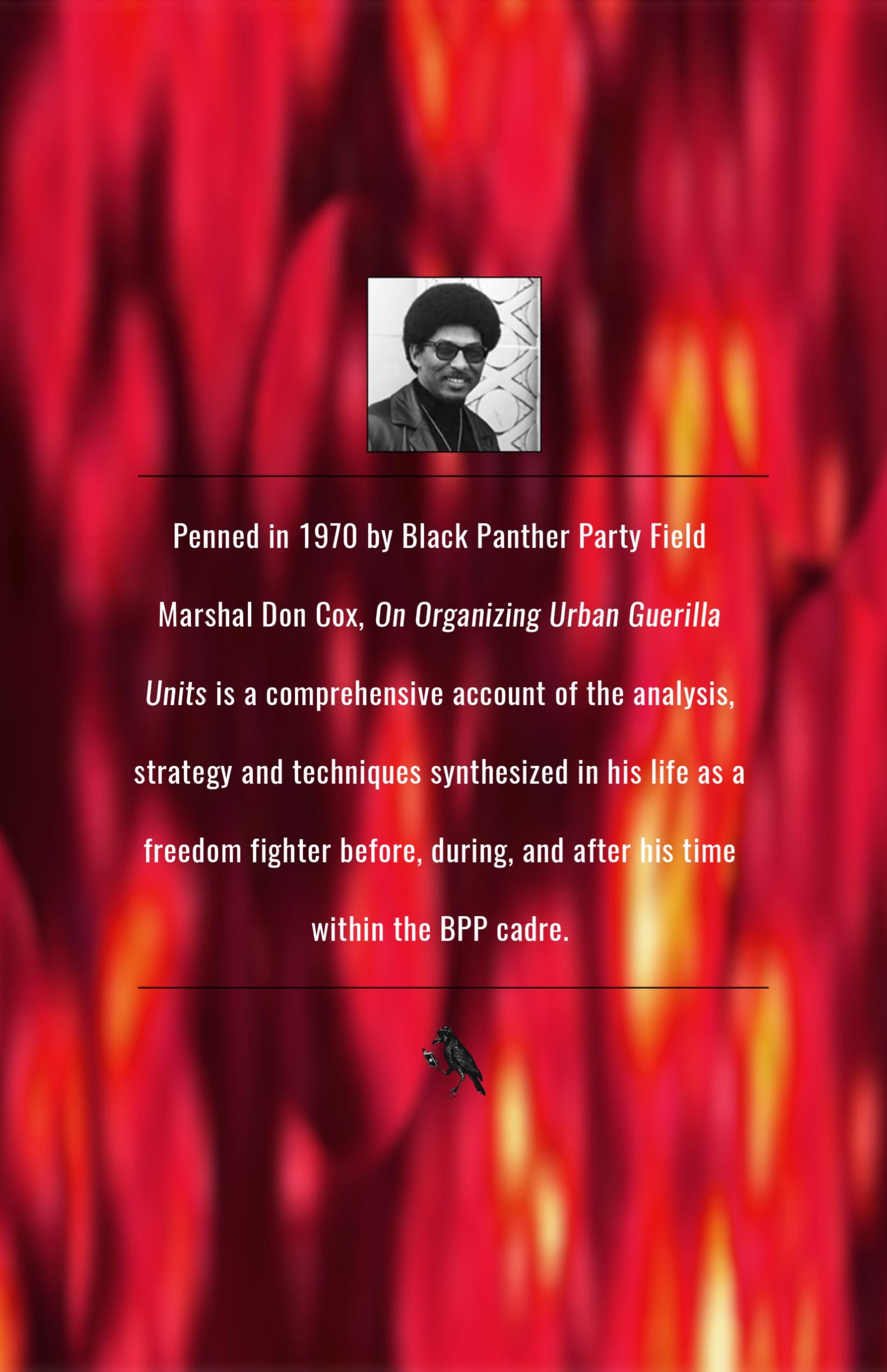Field Marshal D.C.
On Organizing Urban Guerilla Units (2nd Edition)
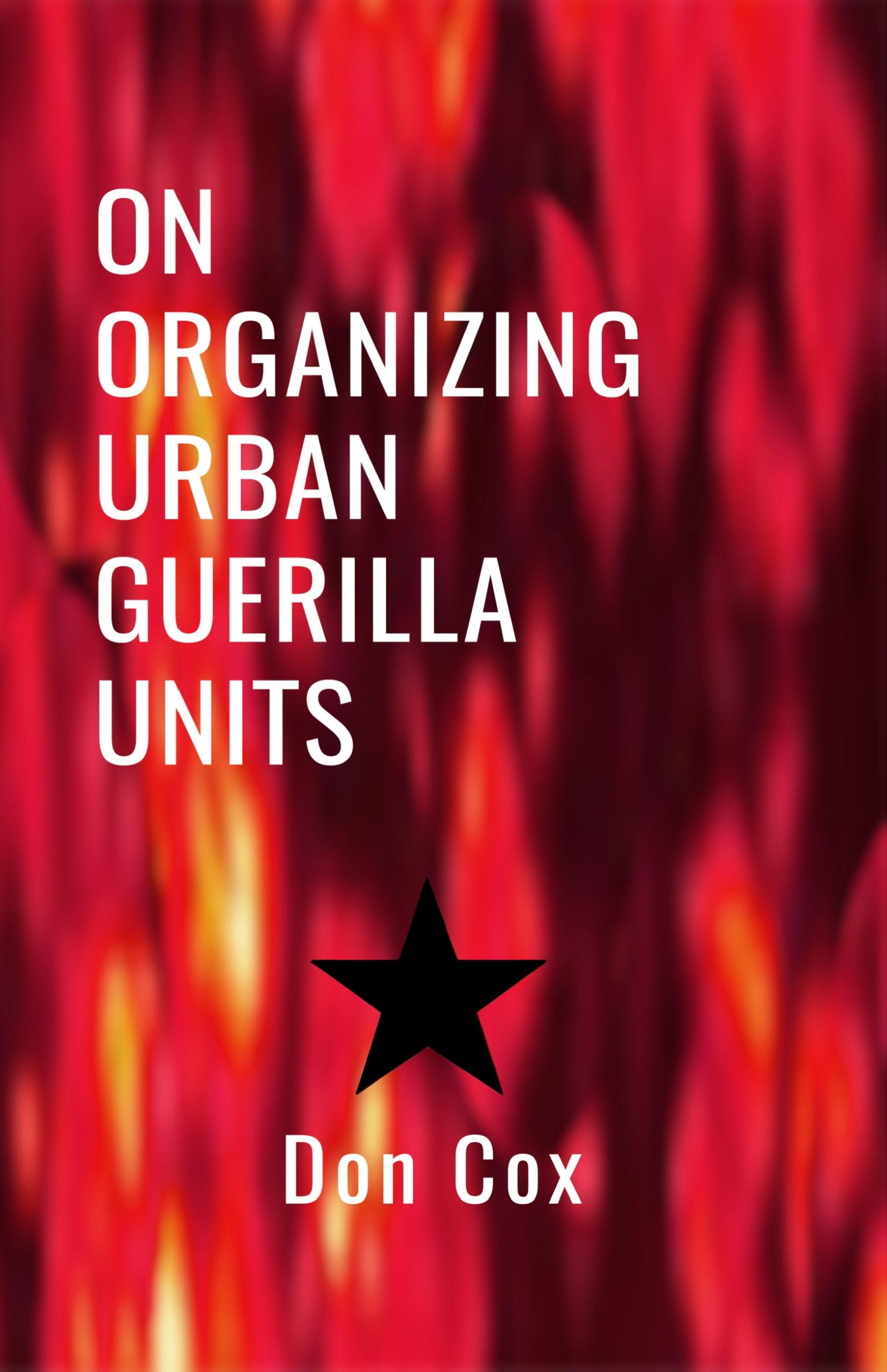
On Organizing Urban Guerilla Units by Field Marshal D.C.
A WORD TO THE SIBLINGS IN THE
MILITARY
HOW WE MUST INITIATE ARMED
STRUGGLE WITHIN AN URBAN
GUERILLA CONTEXT
Part 2: “Long Live The Revolutionary
Spirit Of Field Marshal DC"
Q: Would you tell us a little about your background, and why you joined the BPP?
Q: How did you become the field marshal of the BPP?
Q: What are some of the lessons that you have learned from the last 22 years of struggle & exile?
[Front Matter]
[Title Page]
On Organizing Urban Guerilla Units
by Field Marshal D.C.
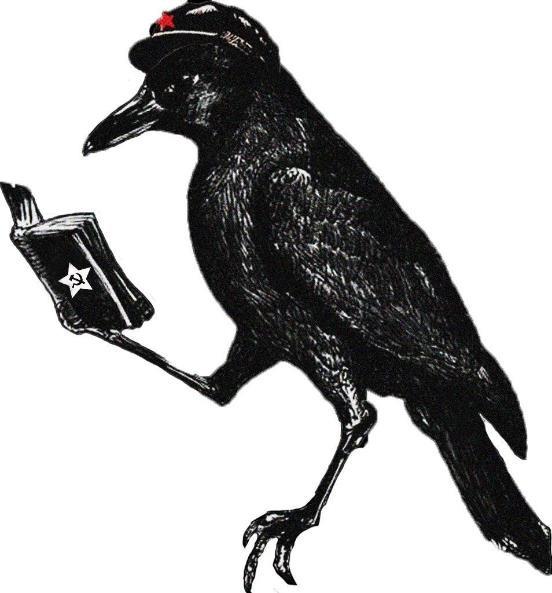
Anti-Copyright 2002 - 2023
No rights reserved. This book is encouraged to be reprinted,
redistributed, recirculated, made accessible by any means
necessary. This work is not an encouragement to violence;
its purpose is solely as educational, archival or research
material.
The Rookery Press #002
Table of Contents
Part 1: On Organizing Urban Guerilla Units 1
SELF DEFENSE ........................................................ 5
PERSONNEL ............................................................ 6
KNOW THE ENEMY ................................................ 10
C. M. I.................................................................... 10
COMBATTING C.M.I................................................ 14
EXAMPLE ............................................................... 17
CORRECTING MISTAKEN IDEAS ............................ 27
SELF-DEFENSE WEAPONS ...................................... 28
WEAPONS TRAINING.............................................. 35
A WORD TO THE SIBLINGS IN THE MILITARY......... 42
FUNDRAISING........................................................ 46
HOW WE MUST INITIATE ARMED STRUGGLE WITHIN
AN URBAN GUERILLA CONTEXT ............................ 47
Part 2: “Long Live The Revolutionary Spirit Of Field Marshal DC" ................................................. 52
Q: Would you tell us a little about your background, and why you joined the BPP? ....................................... 53
Q: How did you become the field marshal of the BPP? 61
Q: You left the U.S. and went into exile in 1970. Can #bookmark47][you tell us what the conditions were in the streets and within the Black Panther Party at this time? ........... 68
Q: When was the International Section of the Black Panther Party established, and how did it come about?.................................................. 76
Q: Tell us about the split in the Black Panther Party as #bookmark49][it developed from the view of the International Section?.................................................................. 80
Q: What were the events leading up to the #bookmark50][dismantlement of the International Section of the Black Panther Party?............................................... 86
Q: What are some of the lessons that you have #bookmark51][learned from the last 22 years of struggle & exile? ..94
On Organizing Urban Guerilla Units by Field Marshal D.C.
[Dedication]
I dedicate these notes to the memory of Brothers Jonathan Jackson and Comrade Carlos Marighella. I also name my son, who was born by Barbara on August 18, 1970, Jonathan Carlos Cox.
Brother Jonathan was the 17-year-old Afro-American Revolutionary who went off into that fascist courtroom in Marin County, California and executed the first contemporary political kidnapping in Babylon. He was cut down in his finest hour during his escape by those fascist pigs who have no regard for humanity. Taking the example of Brother Jonathan to an even higher level we will truly free all political prisoners!!!
Comrade Carlos Marighella was a Brazilian Revolutionary who participated in the first kidnapping of an American Ambassador in Brazil in exchange for political prisoners. He was ambushed by the fascist pigs in Brazil on November 4, 1969. He was 58 when he died. Although there was a great difference in their chronological ages, Brother Jonathan, and Comrade Carlos, one 17 and the other 58, were united around the idea of freedom and liberation. In the revolutionary tradition established before them, they both died the most worthy of deaths, revolutionary deaths. They knew the fascists in control would resort to every means to maintain their system of enslaving the world. Yet, with the banner of freedom and liberation held high, they moved ahead and struck a blow against this system of world slavery knowing full well the consequences for revolutionary activity is victory or death...
Field Marshal D.C. October 8, 1970
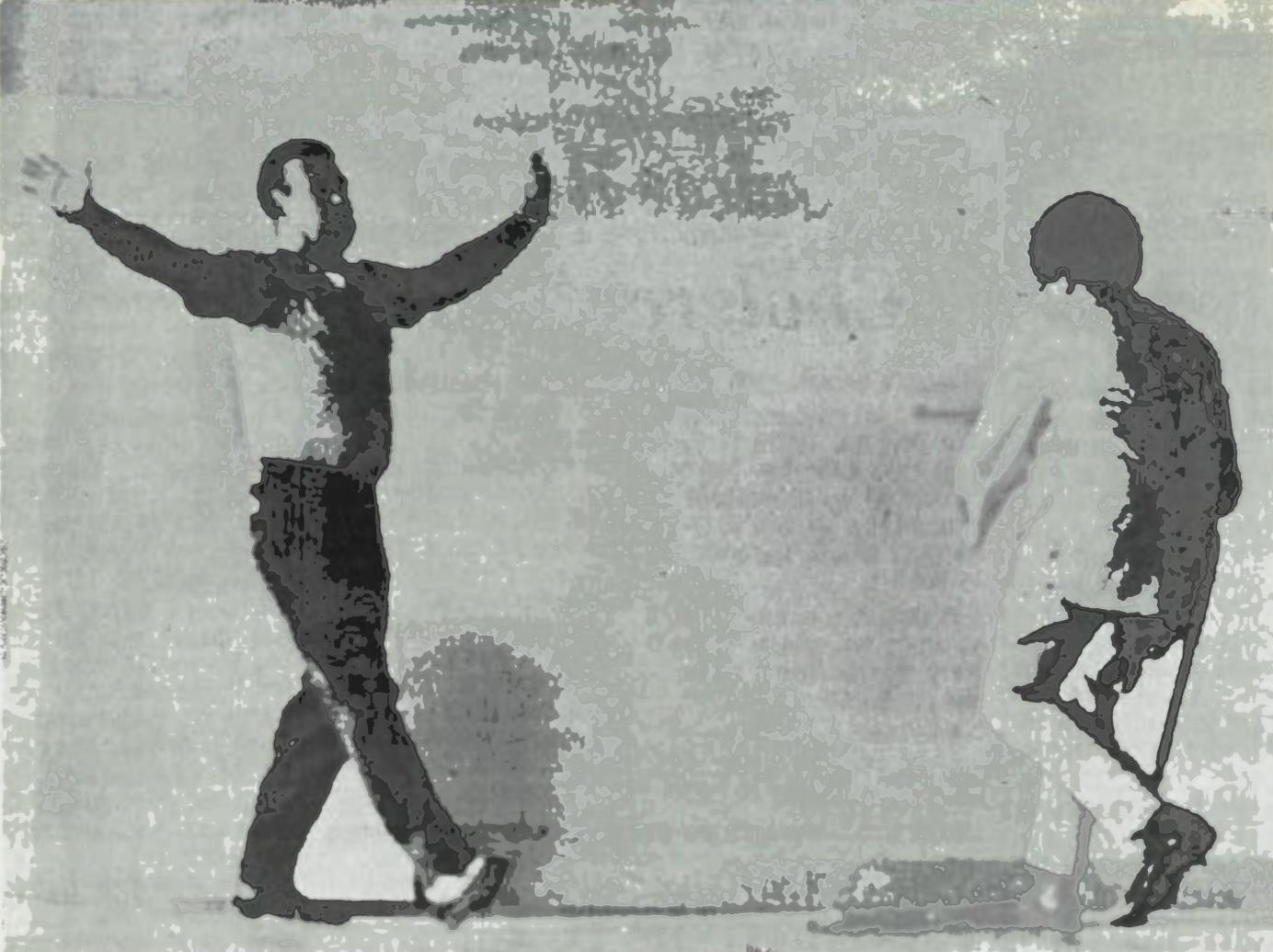
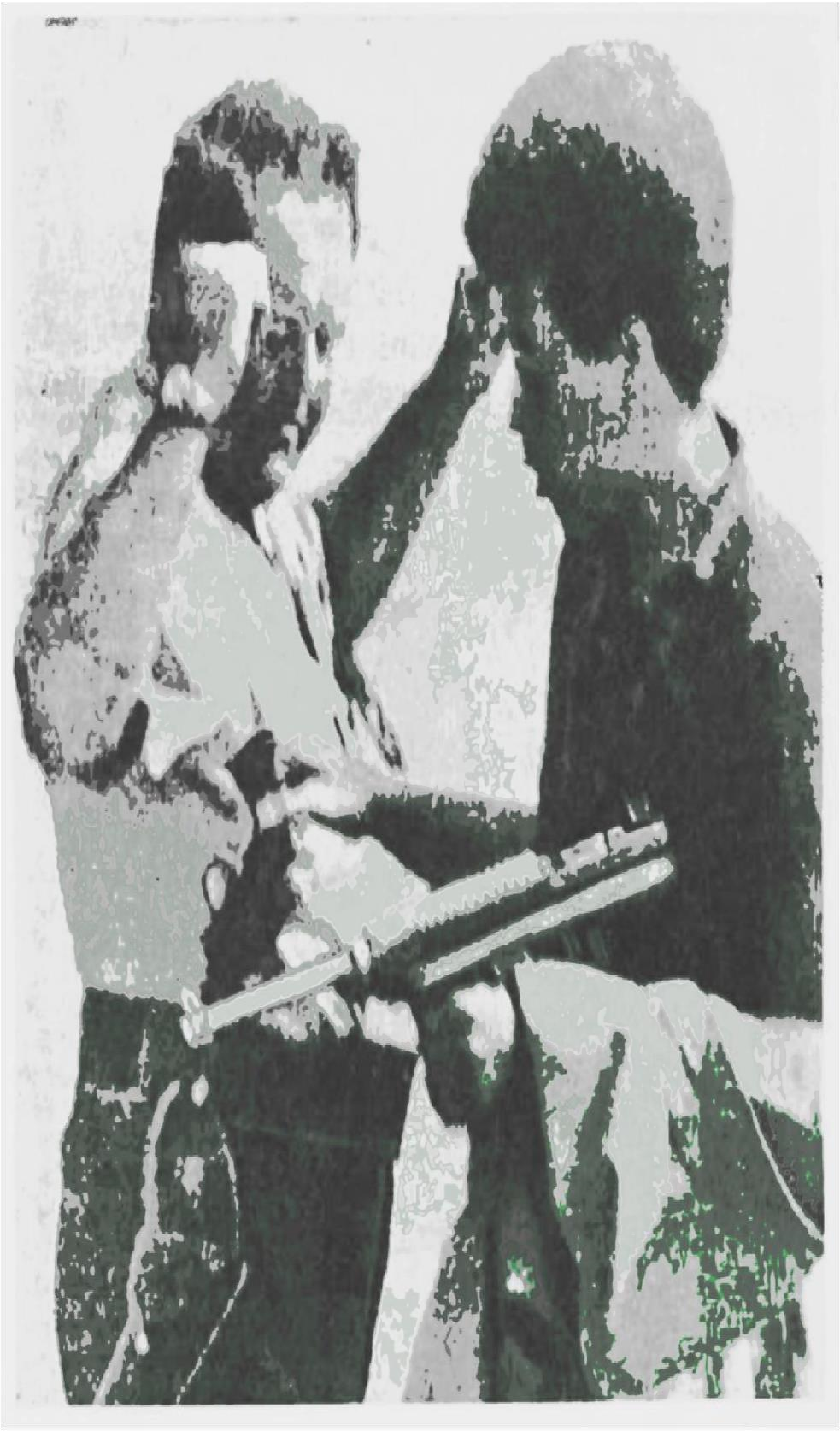
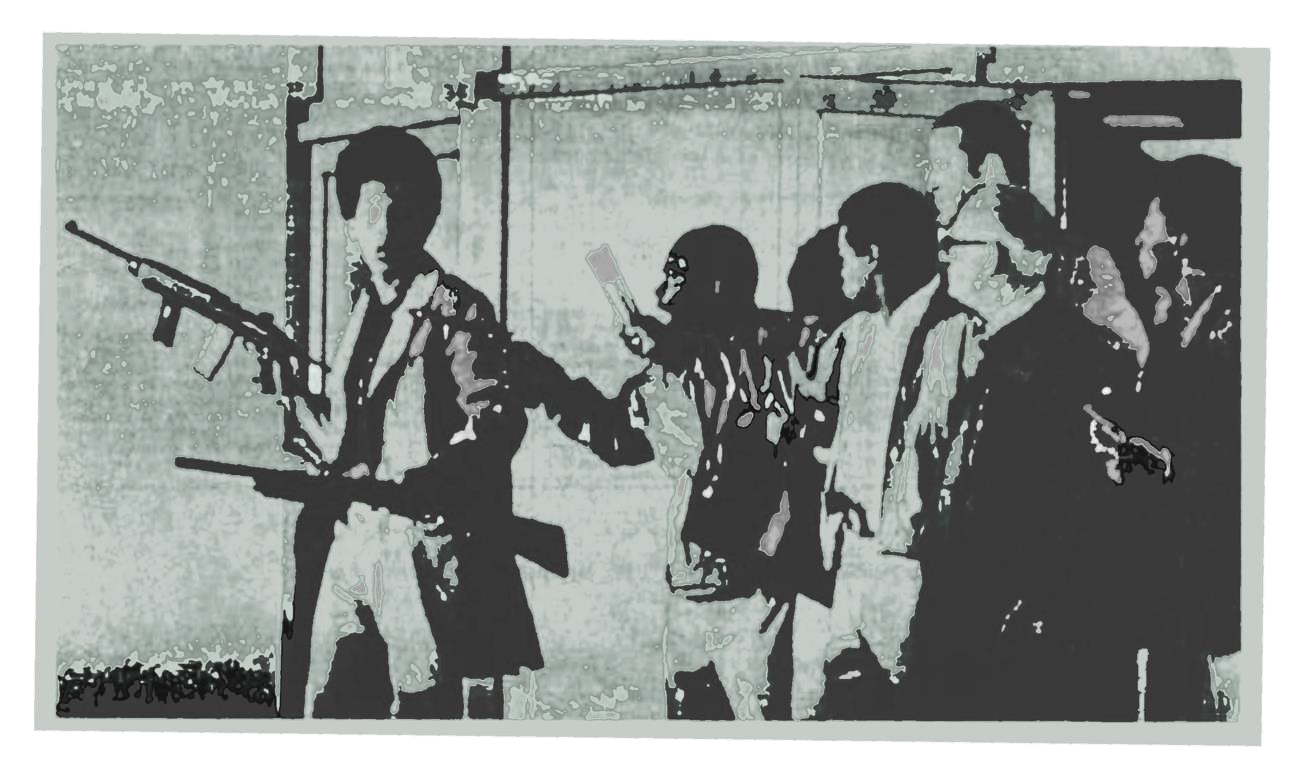
SELF DEFENSE
I will begin by pointing out that we must not allow the racist power structure to define our struggle. What I mean is the language that we use like everything else in this society is in the service of the racist, capitalist bandits. They control the educational institutions, the news media and the means of production that turn out all the educational material. Sometimes we are trapped by the rhetoric (words) of the slave-master. In our 400-Year struggle for survival it has been the guns and force manifested in the racist military that occupy our communities that directly oppress, repress, brutalize, and murder us. So far us to talk about survival we must talk about self-defense against this brutality and murder that is defined by the racist power structure as “Justifiable Homicide”. So, when a guerilla unit moves against this oppressive system by executing a pig or attacking its institutions, by any means, sniping, stabbing, bombing, etc., in defense against the 400 Years of racist brutality, murder and exploitation, this can only be defined correctly as self-defense. The slave-master however, through his lackeys, puppets, and apologists, calls it “terrorism”, the work of crazed men, criminals, insane killers etc. We must define our struggle, not the pigs. Carlos Marighella, an urban guerilla in Brazil, who was assassinated November 4th, 1969, just one month before Fred Hampton and Mark Clark, said, “The accusation of assault or terrorism no longer has the pejorative (negative) meaning it used to have. It has acquired new clothing, it does not discredit, on the contrary it represents a focal point of attraction. Today, to be an assailant or terrorist is a quality that ennobles any honorable man because it is an act worthy of a revolutionary engaged in armed struggle against the shameful military dictatorship and its monstrosities”.
So, with that I say this: Guerilla Units (Self Defense groups) must be formed, and blows must be struck against the slave-master until we have secured our survival as a people.
PERSONNEL
In organizing self-defense groups (Urban Guerilla Units) at this stage of the struggle, the most important consideration is whether or not the person to be incorporated into the group understands fully what they are doing is the right thing to do. At this stage of the struggle if any members of a guerilla unit are weak-minded or do not understand that the only way to put an end to brutality, murder, and exploitation by this racist power structure, is to organize guerilla units and counter attacks; practice has shown that if this weak-minded person is ever captured, they will certainly not be able to withstand the methods of persuasion used by the fascist pigs and they will talk, give up information. So, the first priority for any guerilla unit is to be armed ideologically.
Because of the consequences if anything goes wrong during an operation, members within the group must maintain a face-to-face relationship and get to know each other’s strengths and weaknesses thoroughly and participate fully in the planning of operations. Liberalism at this level can cost the lives of comrades and/or jeopardize the success of an operation.
At this time guerilla units should have no more than four to six members. The struggle at this stage requires no operation that can’t be handled by four to six people. Also, security is sacrificed the larger the group. At this time guerilla units should be formed all across Babylon, the North, the South, the East, and the West. However, units must work autonomously. Under no circumstances should one unit seek out and try to make contact with another unit. Due to the fact that this level of struggle in Babylon is in its embryonic stages, there are many agents, fools and provocateurs running around all across the country. When a member of one unit is captured, they will only be able to give up information on one group. Their own!!!
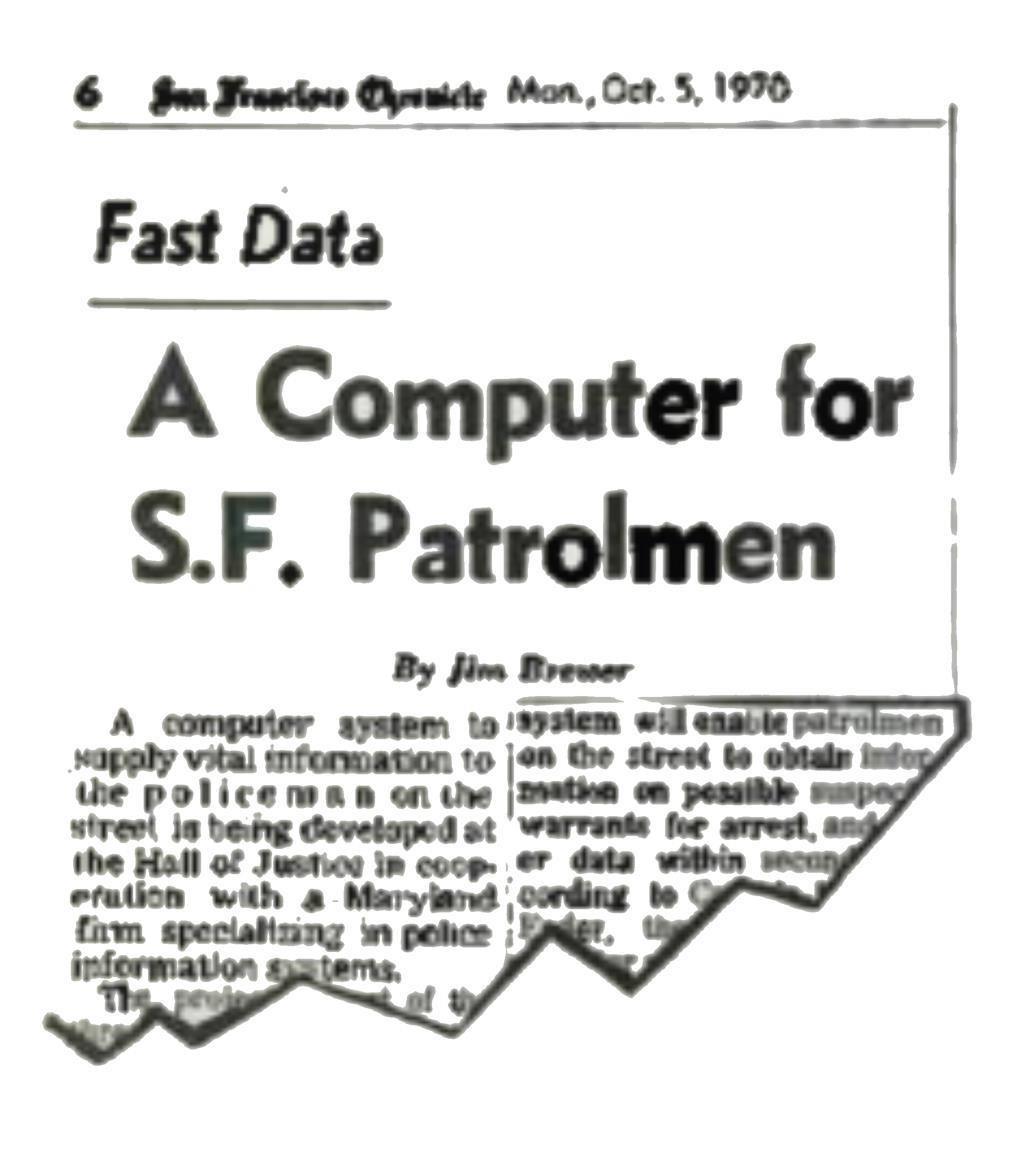
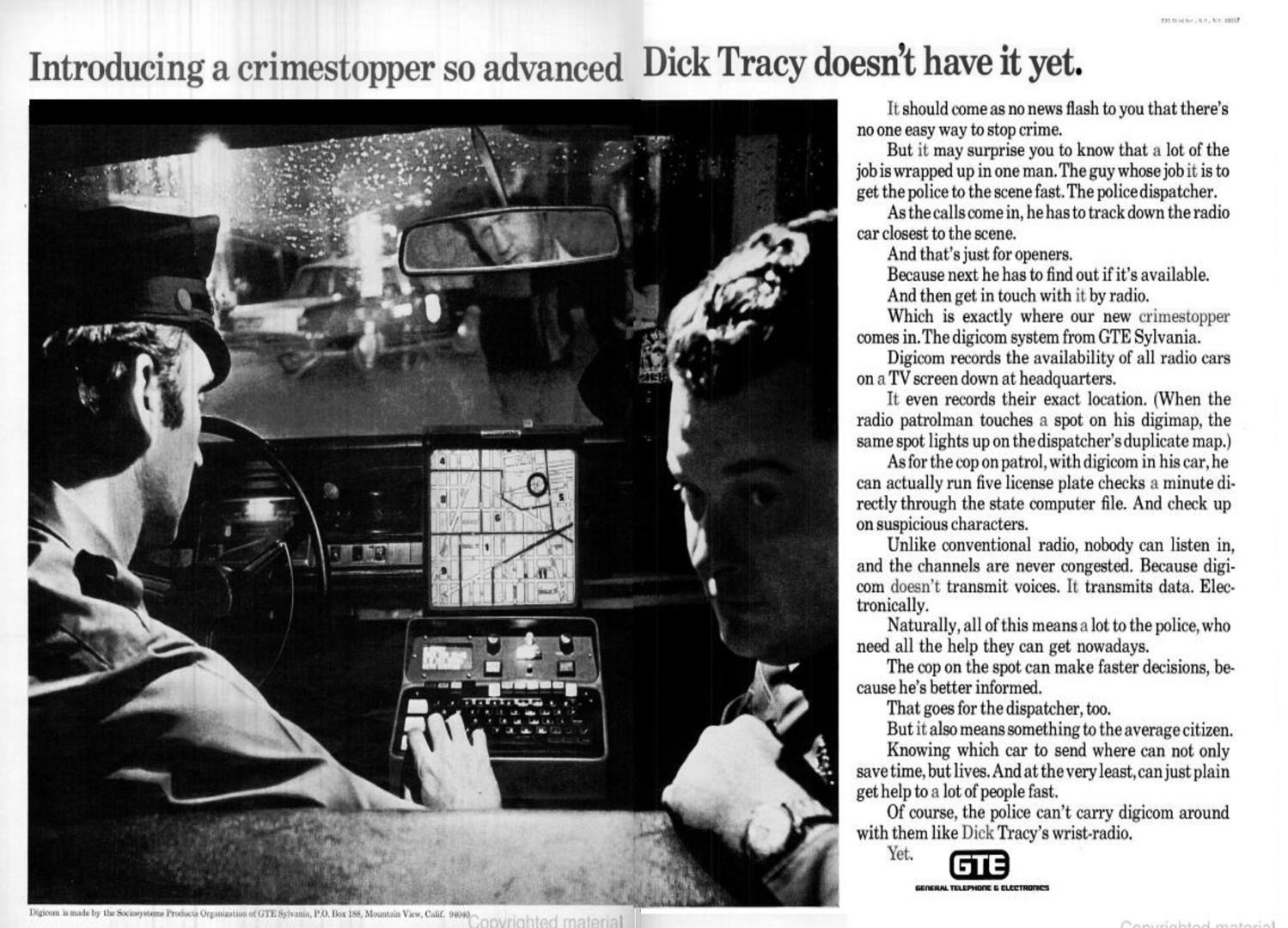
Introducing a crimestopper so advanced Dick Tracy doesn’t have it yet.
It should come as no news flash to you that there’s no one easy way to stop crime.
But it may surprise you to know that a lot of the job is wrapped up in one man. The guy whose job it is to get the police to the scene fast. The police dispatcher.
As the calls come in, he has to track down the radio car closest to the scene.
And that’s just for openers.
Because next he has to find out if it's available.
And then get in touch with it by radio.
Which is exactly where our new crimestopper comes in. The digicom system from GTE Sylvania.
Digicom records the availability of all radio cars on a TV screen down at headquarters.
It even records their exact location. (When the radio patrolman touches a spot on his digimap, the same spot lights up on the dispatcher’s duplicate map.)
As for the cop on patrol, with digicom in his car, he can actually run five license plate checks a minute directly through the state computer file. And check up on suspicious characters.
Unlike conventional radio, nobody can listen in, and the channels are never congested. Because digicom doesn't transmit voices. It transmits data. Electronically.
Naturally, all of this means a lot to the police, who need all the help they can get nowadays.
The cop on the spot can make faster decisions, because he’s better informed.
That goes for the dispatcher, too.
But it also means something to the average citizen.
Knowing which car to send where can not only save time, but lives. And at the very least, can just plain get help to a lot of people fast.
Of course, the police can’t carry digicom around with them like Dick Tracy’s wrist-radio.
KNOW THE ENEMY
At this stage the pigs have three things going for themselves:
COMMUNICATION C.
MOBILITY M.
INFORMATION I.
C. M. I.
(C) With the technological advances of today in Babylon, the pig forces have been able to really tighten up their communication. They have radios, telephones, radiotelephones, and they even have computers in their patrol cars and video cameras that see in the dark. Foot patrolmen also carry small compact 2-way radios. The occupying forces in our communities have more or less instant communication. Therefore, it is possible to alert the total pig force in any major city in a matter of seconds.
(M) Since the major rebellions began in 1965 with Watts, pig forces have adopted the technique of saturating “High Crime Areas” (Black Communities) with many patrol cars and personnel carriers. Most major cities now employ helicopters. With the development of the campus struggles they have also increased their patrols of campus communities such as in the Berkeley, California area around the University of California. Their technical ability to communicate and their technique of having patrol cars only a few blocks apart provide them with good mobility. When an alert or distress signal is received the pigs are able to saturate the “Trouble Area” within 30 seconds to 1 minute in every major city in Babylon.
(I) The pigs use many methods for gathering information such as the method of infiltration using undercover agents. We must also be vigilant of the community informants. Many merchants who operate in our communities’ act as informants. Also, taxicab drivers must be watched carefully. Many cities now have police posing as cab drivers. In cities like New York, they even have police posing as sanitation personnel, telephone repair personnel, gas and light personnel, etc. One method the pigs have used successfully is to harass known sex workers, substance addicts, etc., and threaten to lock these people up if they don’t give them the information they want. Too many times they have been successful using this method. The pigs have also perfected some techniques for asking questions. Many people who don’t relate to pigs, when questioned by them, try to be smart and witty, and unknowingly give the pigs precisely the information they are looking for. So, the rule to follow when arrested or questioned by pigs is give a name and address........period. This is all that
you have to do. Don’t say anything else and don’t sign anything. No exceptions whatsoever. When a guerilla unit has successfully carried out an operation and the pigs have no clues, their method of investigation is jacking up the community and asking questions. They seek information. They get bits and pieces here and there and sometimes they are able to piece enough information together to make a bust. So......keep your mouth shut.
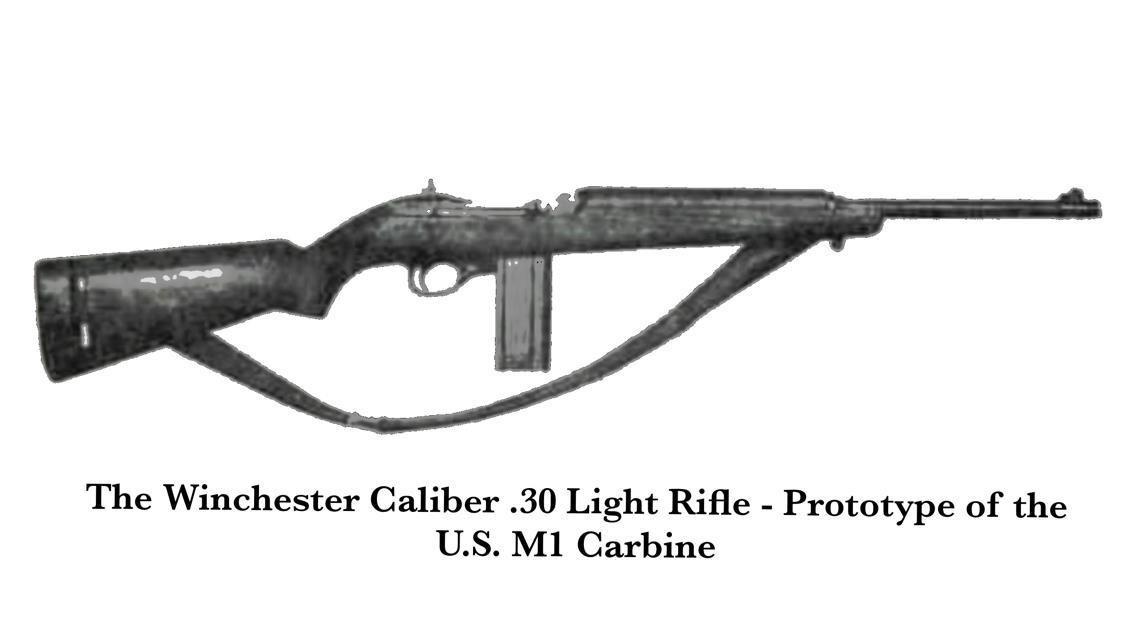
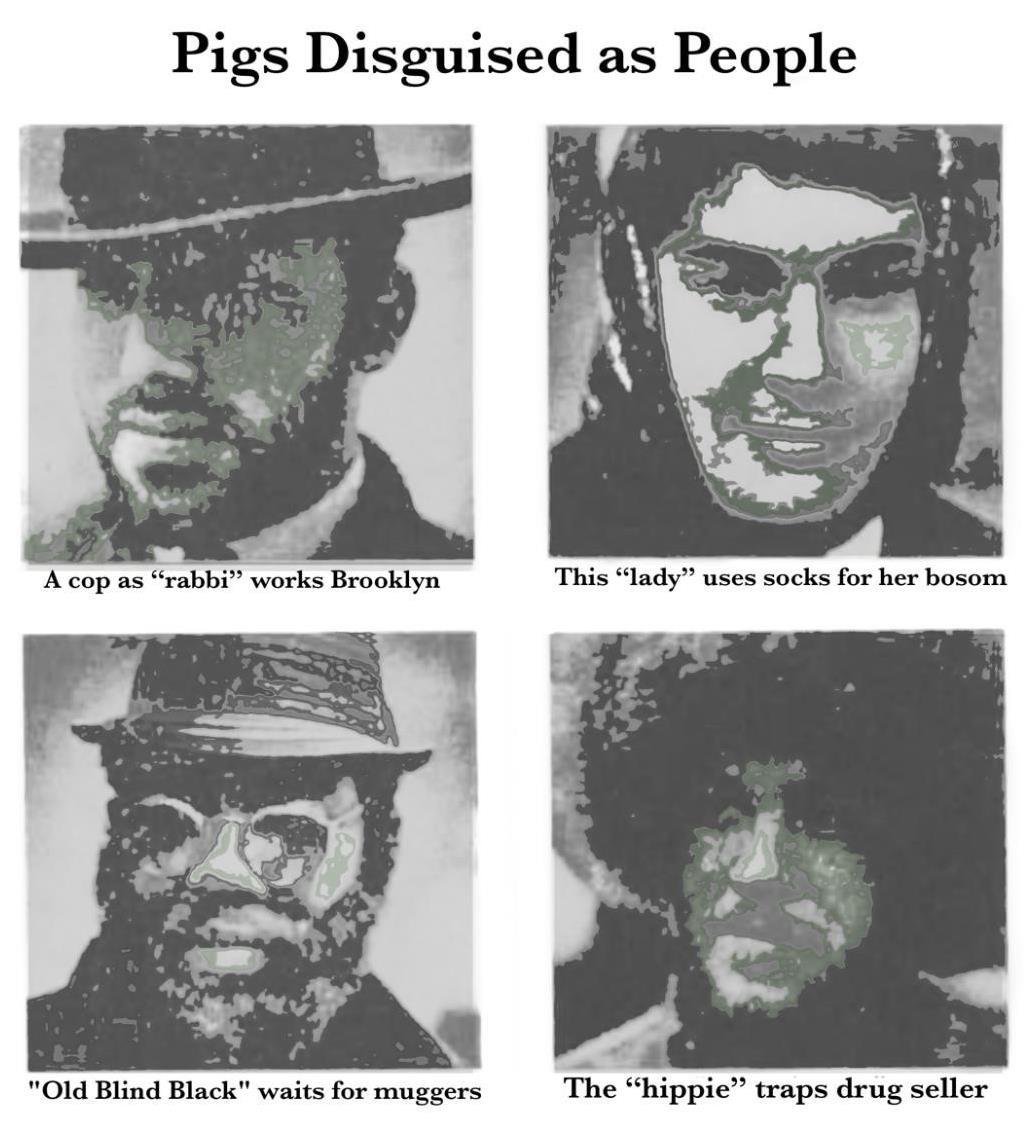
Pigs Disguised as People
A cop as “rabbi” works Brooklyn
This “lady” uses socks for her bosom
"Old Blind Black" waits for muggers
The “hippie” traps drug seller
COMBATTING C.M.I.
To answer the question of how do we combat the pigs’ C.M.I., we must first see what we have going for ourselves. We should relate to the principle of self-reliance, in other words use what you got to get what you need. In checking out the practice of guerilla units we see that we have the power to determine what is to happen, when it is to happen, and how it is supposed to go down. What—When— How: The element of surprise. The pigs have C.M.I and guerilla units have W.W.H.
To consider a guerilla operation successful is not to just plan and execute, but to plan, execute and escape. There have been too many instances of members of guerilla units who have planned and executed righteous blows against the system, only to be captured, wounded, or killed. These are the consequences for revolutionary activity. However, we must keep casualties within an acceptable minimum. The slogan must be Maximum damage to the enemy—minimum damage to us. Practice has shown that when planning W.W.H. if it is done with a knowledge and understanding of C.M.I., casualties will be kept within an acceptable minimum. Too often much attention is given to a plan up to the point of execution without given the same attention to evasion and escape.
This is a one-sided approach, a subjective approach. W.W.H. is only one side of the coin, C.M.I. is the other side. Evasion and escape is the phase of an operation that determines success. Because guerilla units use W.W.H., the pigs’ C.M.I. does not go into operation until a guerilla unit commits itself by actually executing some type of guerilla activity. As I mentioned earlier, once C.M.I. is activated, pigs start arriving on the set 30 seconds to 1 minute in every major city in Babylon. Therefore, the success or failure of a guerilla operation is dependent upon the attention given to C.M.I. and the planning of evasion and escape. As I see it, learning to deal with C.M.I. is the number one military problem facing the revolutionary forces in Babylon today.
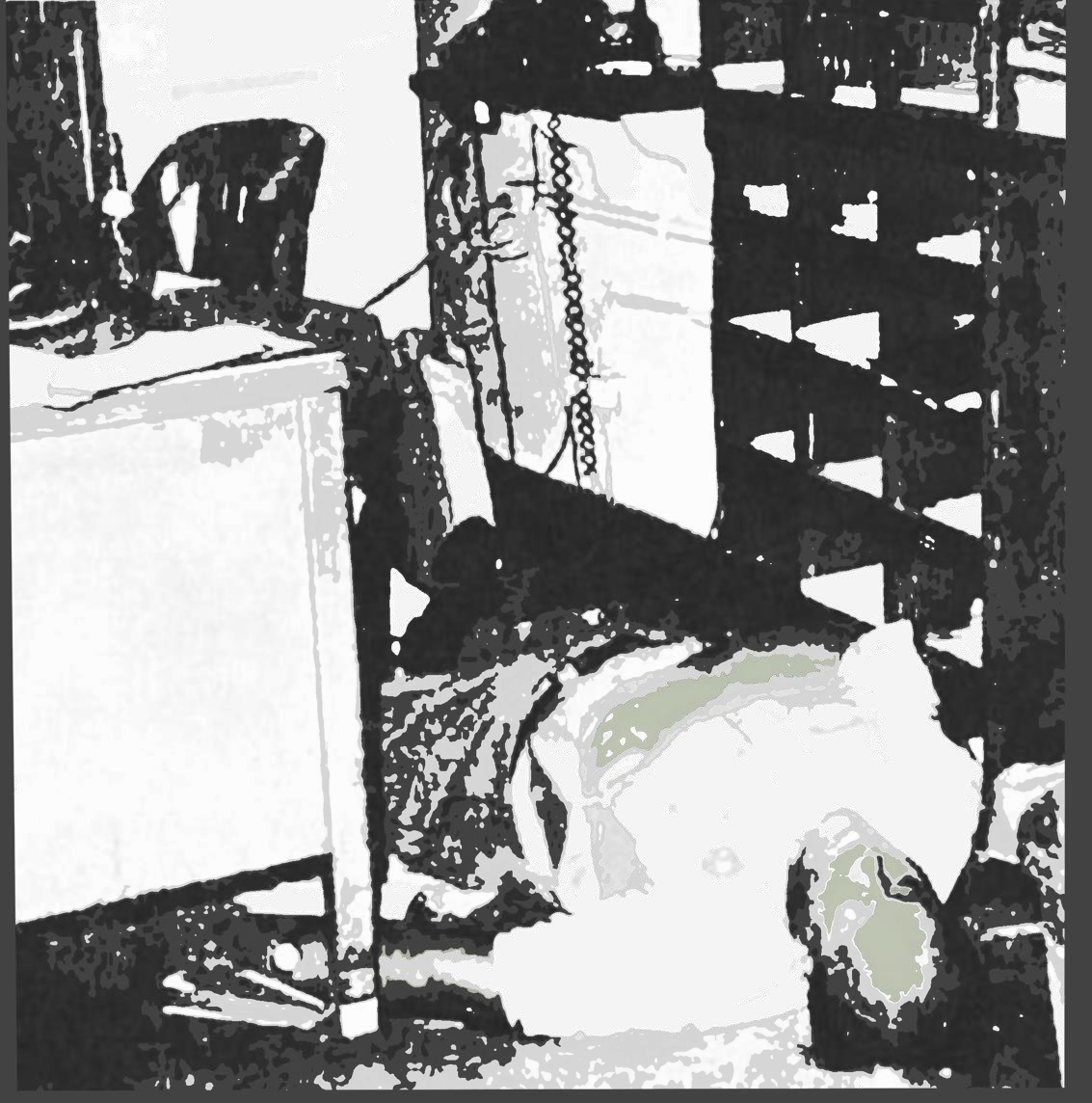
EXAMPLE
I will recall an operation I had the honor of participating in. I will show how the members of our unit dealt with W.W.H. and C.M.I. for security reasons it is necessary that no names are mentioned. However, since I now operate outside established “Law” the body of the text I will keep as close to the incident as possible. It is unfortunate that some of the lessons learned these past few years have not been passed on for security reasons. This is a feeble attempt on my part to rectify that shortcoming.
I was a member of a unit that had three members. We had just added three new members and were dealing with the question of checking out the new people when those stupid Oakland pigs tried to kill Huey. We were aware that the political consciousness of the people was low and if we made a move, they might not see any relationship. But we knew the pigs would know and we wanted them to know that we would no longer see the likes of Malcolm and Huey moved on without them having to pay their dues. We decided to do a sniping job. We felt that with the new members we had best do something light the first time working together. We knew it didn’t take six people to do one sniping job; however, we felt this would give us an opportunity to observe the new members under actual combat conditions that weren’t too strenuous. After deciding what to do the next step was to pick the target. The method we used was to assign each member of the unit the task of submitting a target within a week. At the end of the week, we got together and went over the choices and picked what we thought was the best one submitted, the police substation in the Hunters Point Projects in San Francisco.
The reason we selected this particular target was that the pigs perpetrated a lot of brutality and murder on the people in the area and we related very heavily to the statement, “The racist dog policemen must withdraw immediately from our communities, cease their wanton murder and brutality and torture of Black people, or face the wrath of the armed people”. A tactical reason was the location of the substation itself. It sat at the furthest end of the projects away from the entrance and the main streets. Across the street was the Hunters Point Naval Shipyards. There was a huge cyclone fence separating the shipyard, from the projects to keep people from trespassing on government property. Also, there were no entrance roads from the side of the shipyards, so in addition the station was at the end of all roads deep off into the projects and it could only be approached from one direction.
The next step was reconnaissance. The dictionary defines reconnaissance as the process of obtaining information about an enemy area, the troops in it, etc., by examination or survey, for the next week it was responsibility of each member of our unit to go over the entire area around the target daily, also at night. At the end of the week of reconnaissance we got together to map out our strategy and tactics.
Immediately after getting our heads together and discussing our observations we all agreed that although we had originally planned for this to be a sniping job, the conditions were such that we could assault the target and deal with everyone there. After a week of practically constant surveillance, no more than six pigs were ever seen inside at any one time. This took care of What, the next thing was to decide When.
We decided on Monday night. We felt this would be the best night because the weekends, especially Saturday night, had heavy patrols because of the tendency for the people to exert their misplaced aggressions on the weekends. Also, being the first work night of the week, we felt not too many people would be on the street. This turned out to be the case. So, the decision was to move the first Monday night after we had completed all of our preparations. We decided 11:00 P.M. would be the best time. We discovered during our surveillance that the shifts were changed at 1:00 A.M. but we felt that was too late because at that time there is not much traffic, and our movements would be more conspicuous. But 11:00 was late enough so that not many people would just be hanging out on the streets. The next thing was to deal with How.
Because there were six of us, we decided to use a small delivery van, or pickup truck with a camper. The reason for that was we knew that once the job was done six niggers in a car riding away from the area would look very suspect.
Next, we decided on person would be left with the vehicle to keep it running, one person would be placed on the rear door of the station with a .12 Gauge pump in case one of the cowardly pigs tried to run away and the remaining four of us would actually carry out the assault. We went through several rehearsals (we called them Dry Runs) so when the time came everyone would know exactly what to do and this would eliminate confusion at the decisive moment. Also, if a patrol car came on the scene unexpectedly two of us were assigned to deal with that.
During this period the S.F.P.D. was bragging about how they could respond to an alert anywhere in the city within 1 and 1/z minutes, so we gave ourselves 30 seconds to clear the area after the first shot was fired. We found a good location approximately 1 minute away to stash our cars.
The next thing was armament. The person with the vehicle would have a 9MM Pistol. The person on the backdoor would have a .12 Gauge Shotgun and the four of us who were to assault the station would use .30 Caliber M1 Carbines with 30 shot magazines. We also carried 2 extra magazines in case a patrol car came on the scene unexpectedly while we were getting down. In case we were stopped while we were getting away, we carried 500 rounds of ammo in the truck. It might sound like we were loaded for bear, but we wanted to be prepared for any eventuality. Each of us carried a 9MM Pistol.
It was finally time for us to move. Early in the evening we met and went over our plans. Everything was okay. The next thing we did was put on cotton gloves, breakdown our weapons and wipe each part down to completely eliminate any fingerprints. This was done in case someone dropped one. We didn’t want to give those pigs anything to go on. We then sent out a person to find us some transportation. We would always wait until the last minute to rip off our transportation because with the pigs’ communication it is possible for a stolen vehicle to be on the hot sheet in less than an hour. We always wanted our ride to be as cool as possible. They returned with a pickup with a camper on the back. I drove with one person riding shotgun, and the other comrades rode in the camper. I wore a black trench buttoned all the way up, underneath I wore a suit and tie with a white shirt. After the attack I took off the trench and tried to look square.
We arrived at the target and as an additional bonus there was a wet, heavy fog, typical of San Francisco. We parked and made a last-minute check of the area. At that time a patrol car drove up, with two nigger pigs. This was good because there only appeared to be one pig inside at the time. One of the pigs was Waterfield, whom we knew had a reputation for helping brothers out when they were being harassed by white racist pigs. The other pig was a big burly bootlicking pig named George. The year before he had shot a brother in the Fillmore District and the people moved on him. To quote him, “He was rescued by his white police brothers”. He had to go, but we decided to give Waterfield a pass which turned out to be a mistake. In January of 1968 the S.F.P.D. created a truly Gestapo division of the S.F.P.D. called the San Francisco Tactical Squad and Waterfield was one of the first niggers to sign up.
We waited for them to get inside the station. We got our stuff and moved out. The person placed on the backdoor and the four of us were at the corner of the building. At this point there wasn’t anything to do but do it. We paused without saying a word. We all looked at each other, swallowed, then stepped on around the corner single file.
The windows we were to fire through were very low, about waist high. The windows ran the whole length of the station. If you stood outside you could see in every room, but inside you couldn’t see what was happening in any room but the one you were in. I was in front, and no one was supposed to fire until I reached the window covering the last room. I passed one room and there was a pig looking at me.
He was cool, so I was cool. However, when the man behind me saw the pig, he assumed the pig knew what was happening. He called the pig a dirty motherfucker and opened fire.
I ran to the last window and Waterfield and George were already on the floor. It appeared they were trying to find something to hide under. I opened fire and the rest of the comrades opened fire and for a minute it sounded like the Fourth of July. I fired and hit George about six or seven times, turned to the other comrades, signaled and we got in the wind. We picked up the person on the backdoor, jumped in the truck and split. As we were on our way out of the area, it was approximately one minute before the first pig car passed us on the way to the station with its red light flashing and its siren wailing. It took us two minutes to leave the area, reach the place where we had stashed our cars, transfer the weapons to the car I was driving and go our separate ways. I stashed the weapons at our stash pad, the drove to a pad. Just a little review here. We used .30 Caliber Carbines with Military Ball ammunition. If I remember correctly George was hit six or seven times. He had emergency surgery, was in intensive care and lived for one month before he died. True enough, he was a big burly pig, but we were firing from no more than 10 Feet. Based on this experience I recommend the .30 Caliber Carbine be used for target practice. It just does not have the knockdown power we need. Prior to this operation we had trained extensively with our weapons, and we didn’t have to worry about them. This was very key to our success. Not having to think about our weapons, we were able to concentrate on the job itself. For this operation it took the pigs 10 minutes to seal off the area and set up roadblocks, but because of our planning around the pigs’ C.M.I. we were all well away and safe in those ten minutes.
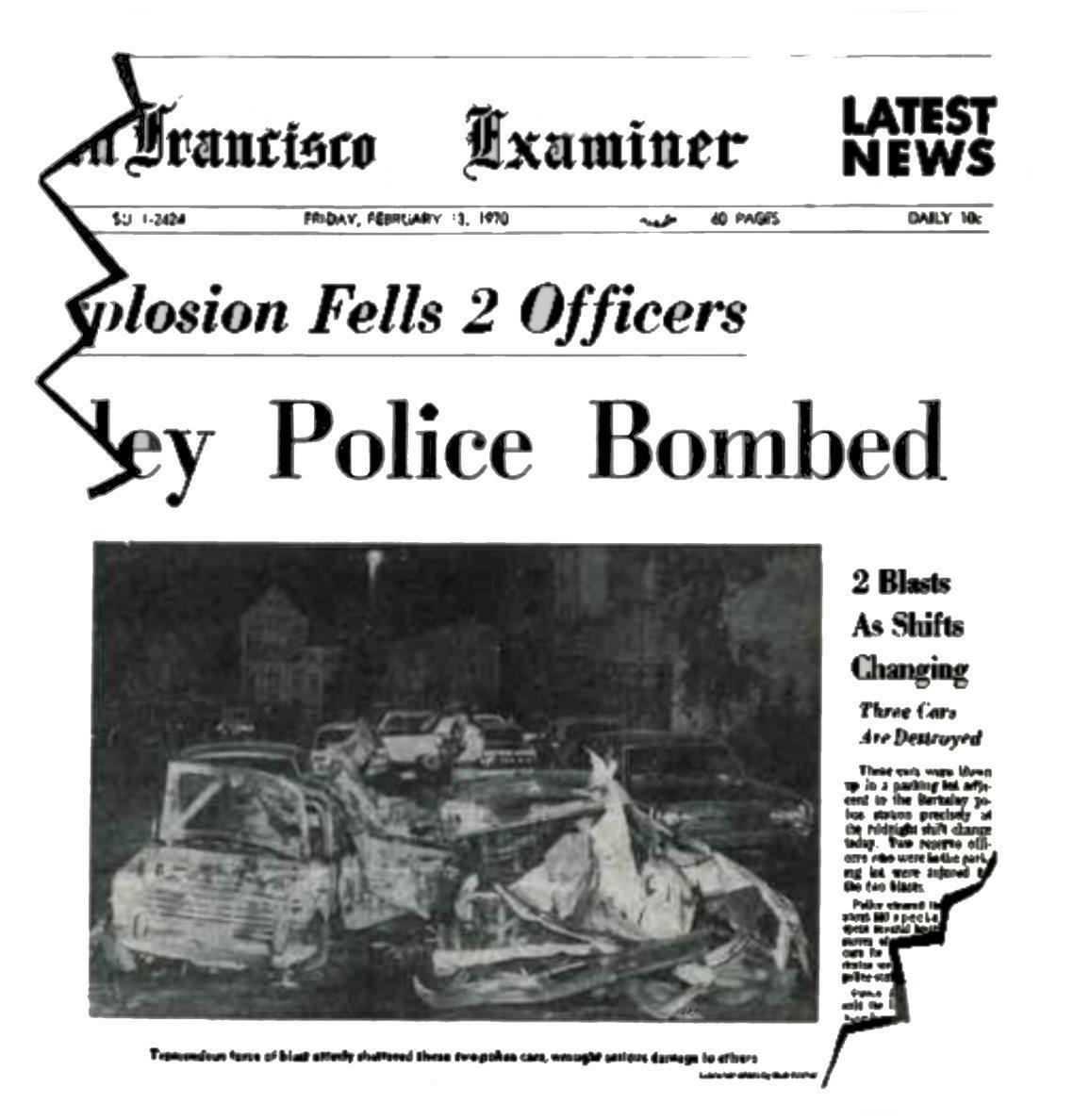
MORE ON DEALING WITH C.M.I
We must begin to make direct attacks against the pigs’ C.M.I guerilla units must seek out and destroy vital links in the pigs’ communication and transportation system. So, make them spend millions, billions of dollars on erecting cyclone fences, installing flood lights, erecting guard huts, and establishing foot patrols around every one of their communications’ installations and every one of their vehicle parking lots in Babylon. Attack them at will. Retaliate and avenge every revolutionary death in the world that is done in the name of freedom and liberation from the pigs of the united states, and their lackeys, and their evil system of world slavery.
When we examine our history and study past slave revolts, we see that almost without exception they were crushed because of agents and informers of the slavemaster. So, when after an investigation we discover an agent in our midst they must be eliminated swiftly, the slogan must be, “Death to all informers”. If we begin to intensify our efforts in these directions this will definitely deal blows and take away the pigs’ advantage of C.M.I. The use of incendiaries and explosives are very important elements in the arsenal of guerilla units. Sabotage will play a very important role in helping us deal with the pigs’ C.M.I, also sabotage in general will play a very important role in our struggle. Simply because sabotage gives us more time in which to deal with C.M.I.
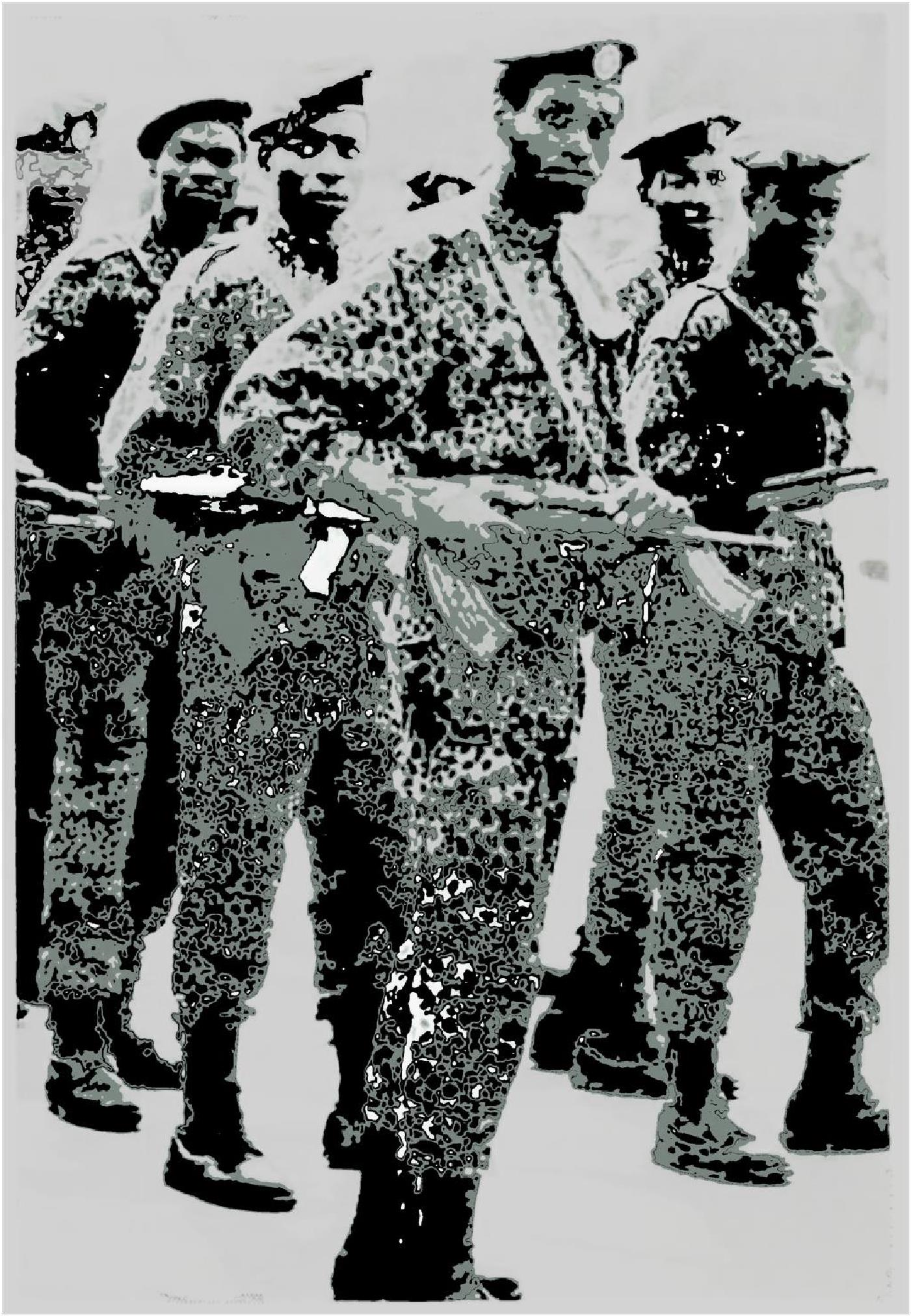
CORRECTING MISTAKEN IDEAS
I have seen many articles in underground papers about weapons and many of them have put forth some erroneous ideas. The thing we must keep foremost in our minds is we are in Babylon, and we must deal with our situation with the resources available in Babylon. There is nothing more I would like to do than write and talk about the AK 47. This is one of the finest assault weapons in the world. However, they are not available in Babylon, neither is the ammunition. So, it would only be an exercise in futility and a total waste of time.
I have also seen long dissertations on the merits of the likes of the .303 Enfield, the 7MM Mauser etc., all kinds of bastard weapons and calibers. Not that these weapons are not good weapons, but our stash is the enemy’s stash. Believe me they don’t have any of those oddball weapons or calibers in their arsenal. At all times we must concentrate on having the same weapons the pigs have. If not the same weapons, they must be the same caliber. The time is fast approaching, it might be here, when we will no longer be able to buy ammunition. When this day comes the source of ammunition is the pigs’ arsenal. So, if you get caught in this situation with the likes of a .303 or a 7MM or some other foreign caliber weapon, at that point it is no better than a club.
By the same token if you have the finest weapons and don’t know how to use them, they are no better than clubs. However, with enough of the correct practice and knowing where to place the bullet it is possible to kill an elephant with a .22. However, with enough practice with the following pieces and arming yourself ideologically, it is possible for you too to become a match for one hundred. The same as those 12 Panthers who were attacked by 500 pigs, had a 5-hour battle, and survived, in December of 1969 in Los Angeles.
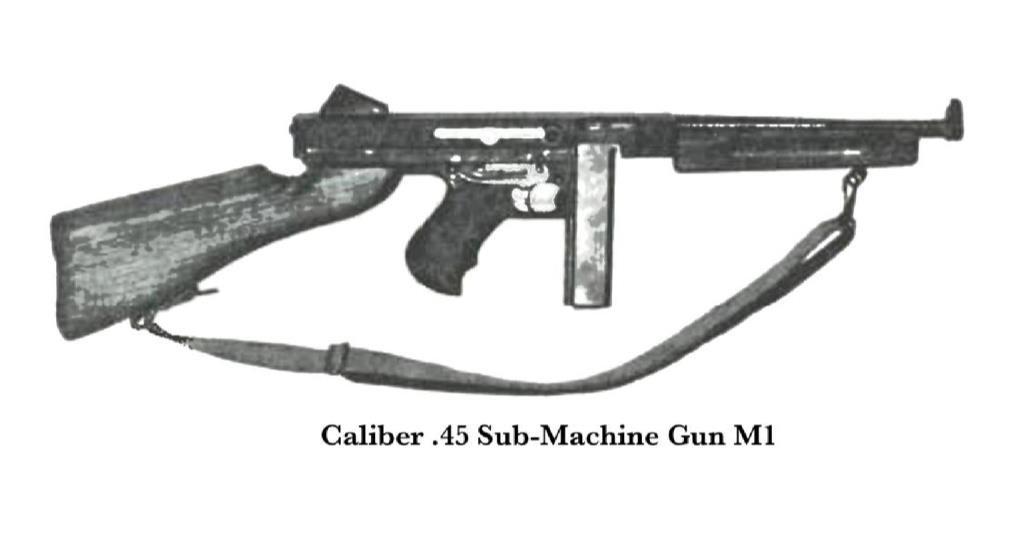
SELF-DEFENSE WEAPONS
Due to brainwashing done by T.V., movies, comics, etc., there are a lot of incorrect ideas about firearms that must be cleared up. The first thing to understand is there is no one piece (Gun) that covers any and all situations. Although they show pigs on T.V. and in the movies killing people a block away with a snub-nosed .38 Revolver, in reality this is not very practical and shouldn’t even be attempted. From
seeing too much Wyatt Earp and Matt Dillon, too many people think that if they have a handgun, either a pistol or revolver, that they are ready for anything. All that is necessary to give you a different perspective is to examine the armament of the pigs that occupy our communities anywhere in Babylon. When you do that, you will discover that most pig cars have at least one .12-gauge pump or automatic shotgun, one or two bolt-action rifles with a scope mounted for sniping purposes and, of course, the pigs have strapped on at least one handgun, either automatic pistol or a revolver. In San Francisco, the S.F. Tactical Squad Members carry two handguns, their standard service revolver plus a second handgun which is their personal preference, in many cases an automatic pistol. So, at this time let’s examine these three types of weapons— the shotgun, the rifle, and the handgun.
The Shotgun:
The pigs use the .12-gauge shotgun, either pump or automatic, loaded with 00 Buckshot generally in crowd situations such as rebellions. The standard load is nine pellets per shell. However, there is the Magnum load of twelve pellets per shell. These magnum loads are to be used only in magnum shotguns. If you use magnum loads in a regular shotgun, you might not live to tell it.
The pigs also use slugs, one giant lead ball. They use slugs to knock armor plate off doors and windows.
There is also a tear gas shell now designed to be fired from a .12-gauge shotgun. Every black home should have at least one .12-gauge shotgun to be used to protect the door. Use 00 Buckshot and it will deal with any criminals trying to enter uninvited.
Cuban Guerillas used shotguns very successfully in the revolutionary war led by Che and Fidel. They would set up ambushes close to roads usually only a few feet away and shotguns loaded with 00 Buckshot would have a devastating effect upon the occupants of cars and/or trucks. We can do the same.
There is another use of the shotgun at this point of our struggle, that is: the barrel of the shotgun is smooth bore (there are no groves inside the barrel) therefore no grove marks appear on the pellets. Therefore, the shotgun is ideal for executions because one of the methods of investigation used by the pigs is checking grove marks. This process of investigation used by the pigs is part of what is known as a ballistic check. They can’t make an investigation based on ballistic marks when you use a shotgun. Therefore, this is an ideal weapon for executions at this time.
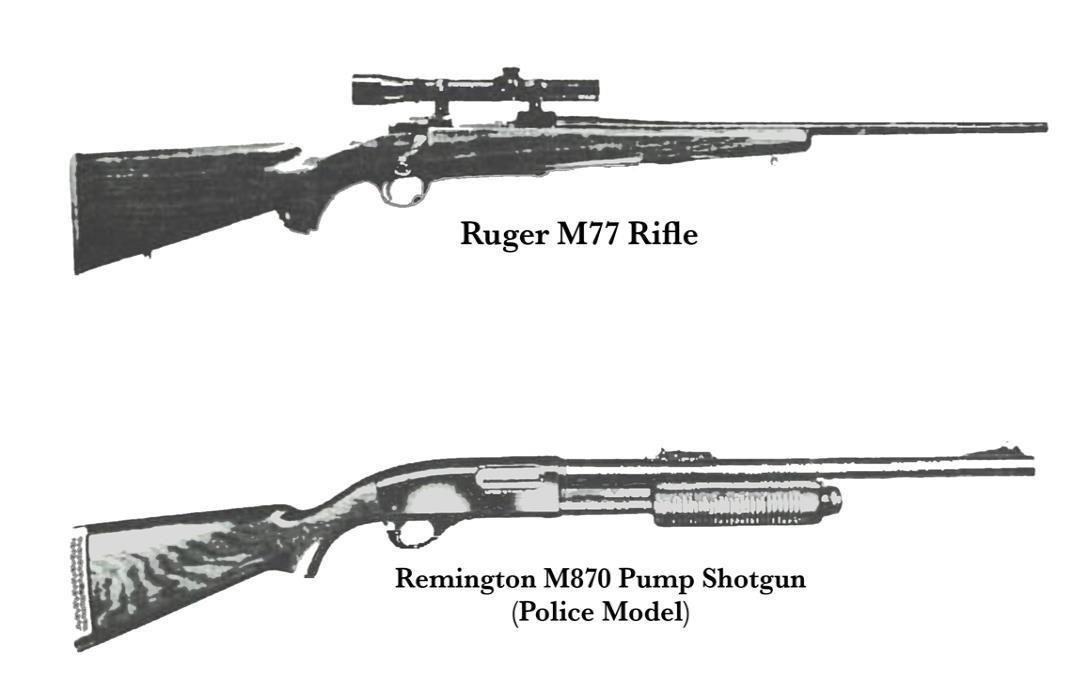
[Remington M870 Pump Shotgun (Police Model)]
The Rifle:
The Bolt Action Rifle: in caliber .30-06 or .308 (7.62MM NATO with a four power (4X) scope, or stronger, mounted is a sniping weapon. A specialist piece. This virulent (deadly) combination is for one purpose and one purpose only - to fire one well- placed shot.... so, each self-defense unit needs only one such weapon at this time. There is nothing more to be said about that.
The Assault Rifle: is either semi-automatic or fully automatic. Ideally it will have a mechanism that allows you to adjust the fire to either semi-auto or full auto. The limit available is that posed by the limit of the enemy’s arsenal. Here we will discuss the most common seen in our communities carried by the occupying gestapo pig forces.
The AR-15 Caliber .223 is the semi-automatic civilian model called “Sporting” model of the M-16 used in Vietnam. The M-16 fires either semi-auto or fully auto. After the lives of many brothers were lost in Vietnam because the weapon was new and untested, it has now been de-bugged and is fairly reliable. It can be found on all military bases and some gestapo pig arsenals. The AR-15 was taken off the public market and replaced by the AR-180 Caliber .223 the same as the AR-15 and M-16. The AR-180 does not appear to be as good as the AR-15, however many pig departments are stocking up on them.
Another good assault rifle is the M-14, Caliber .308 (7.62 MM NATO). This is a very good weapon although it has been replaced by the lighter M-16 in the fascist military. Most national guard units. At least in California, are equipped with the M-14. Check your local national guard availability.
The Thompson Sub-Machine Gun: in good working order is very reliable in .45 ACP Caliber. It fires either semi or fully auto. One rewarding feature is it uses the same ammunition as the .45 Auto Pistol. Therefore, only one type of ammunition is necessary for your stash. Check your local police/mafia arsenal for availability.
Finally, the age old N1-Garad Caliber 30-.06. Very good, plenty of them around, heavy, and accurate way out, easy to get and plenty of ammo around. Check your pawn shops and gun shops also some national guard units and college ROTC units have the readily available.
The M1-30 Caliber Carbine: Use it for target practice and training. Assault rifles are to be used in fire fights, more commonly known as shoot-outs. People waging wars of liberation around the world also use assault rifles to annihilate (wipe out) their enemies in ambushes and in counter attacks against fascist military outposts as we have also done.
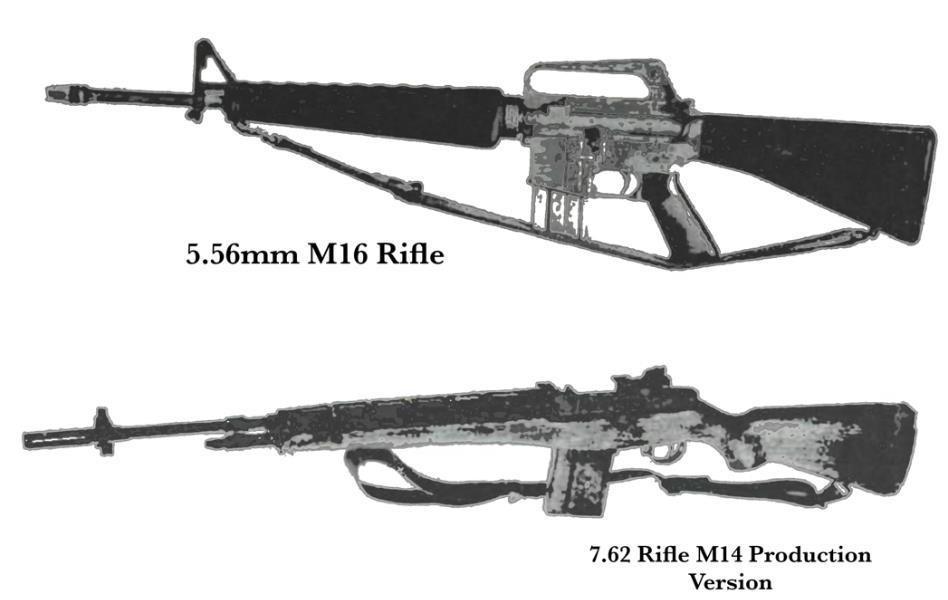
[7.62MM // M-14 Production
The Handgun:
There are two types, semi-automatic pistols, and revolvers. There are so many different brands and calibers, I will only deal with what I consider to be the best choices.
.357 Magnum Revolver: made by either Colt or Smith & Wesson. It holds six shots and with armor piercing ammo is supposed to crack an engine block. Many pig departments have switched or are switching from .38 special to .357. There was an incident where a brother was defending himself against a pig and fired at the pig with a .38 special. The bullet hit the pig’s badge and was deflected. Had the brother been using a .357 Magnum that would have been one barbecued pig.
9MM Automatic Pistol: Although pistols are called “Automatic”, they are really semi-automatic. The trigger has to be pressed for every shot. I recommend the Browning 9MM automatic, it comes with a 13-shot magazine. With a round in the chamber that makes 14 shots available. If you’re up against someone with a six-shot revolver they will have to reload two times and you’ve still got two shots left. You can also purchase a 21-shot magazine. That’s a lot of firepower for a handgun.
.45 Automatic Pistol: This is still the sidearm issued to the U.S. Fascist Military Troops. It uses the same ammo as the Thompson sub. They also can be purchased in stores. There also seems to be a lot of these available in the streets. Check with your local street merchants.
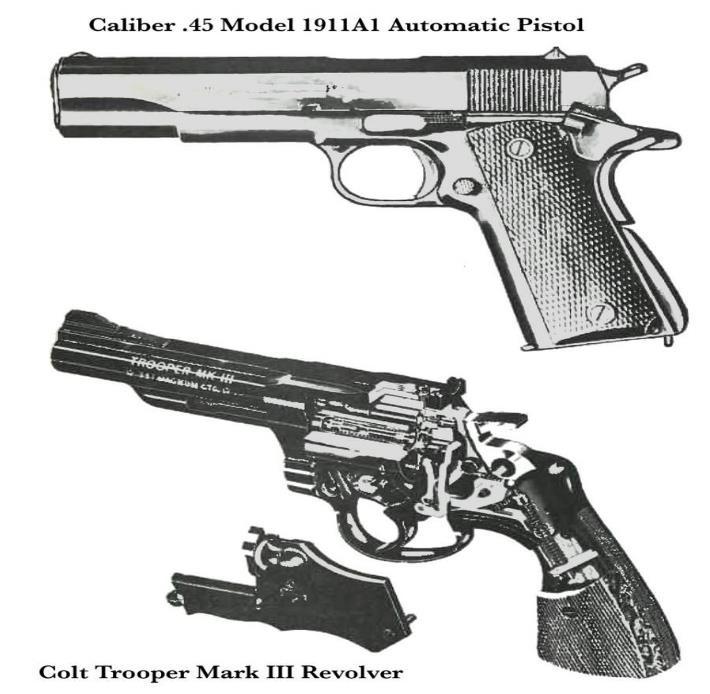
[Cot Trooper Mark III Revolver]
WEAPONS TRAINING
Practice-Practice-Practice-Practice-Practice-
Practice-Practice.
In order to perform well in your work on all levels it is necessary to practice. The more you practice the better you perform. Don’t think just because you have read something you can do it. You can memorize a book on how to drive a car but until you get behind a wheel and practice you still can’t drive.
The first things to understand before you ever put a round of ammo in a chamber are basic safety rules. 99% of all accidental shootings happen with guns that aren’t supposed to be loaded and/or by people that say, “I’m sorry, I didn’t know it was loaded”. Therefore, rule #1 is: The first thing you do when you pick up a weapon is to check to see if it is loaded. Keep your finger off the trigger and follow the following procedure. Point gun away from area where someone could possibly be shot.
If it is a revolver swing out the cylinder. If it is a pistol, remove the magazine and pull back the slide. Even after you have unloaded the gun and see that it is unloaded, treat the gun in the manner as if it were still loaded. Never touch the trigger unless you are practicing trigger squeeze (explanation later), firing on training ground, or dealing with the enemy. Never point a gun at anyone you don’t intend to shoot. I can’t stress these points enough. They seem simple enough. However, people generally who haven’t had any experience with pieces violate these rules constantly. If I am ever shot accidentally by some idiot, it will be very difficult to suppress the desire to blow their head off, providing I’m only wounded.
“In Guerilla terminology, strategy is understood as the analysis of the objectives to be achieved in the light ofthe total military situation and the overall ways of searching these objectives.”
-- Ernesto “Che” Guevara
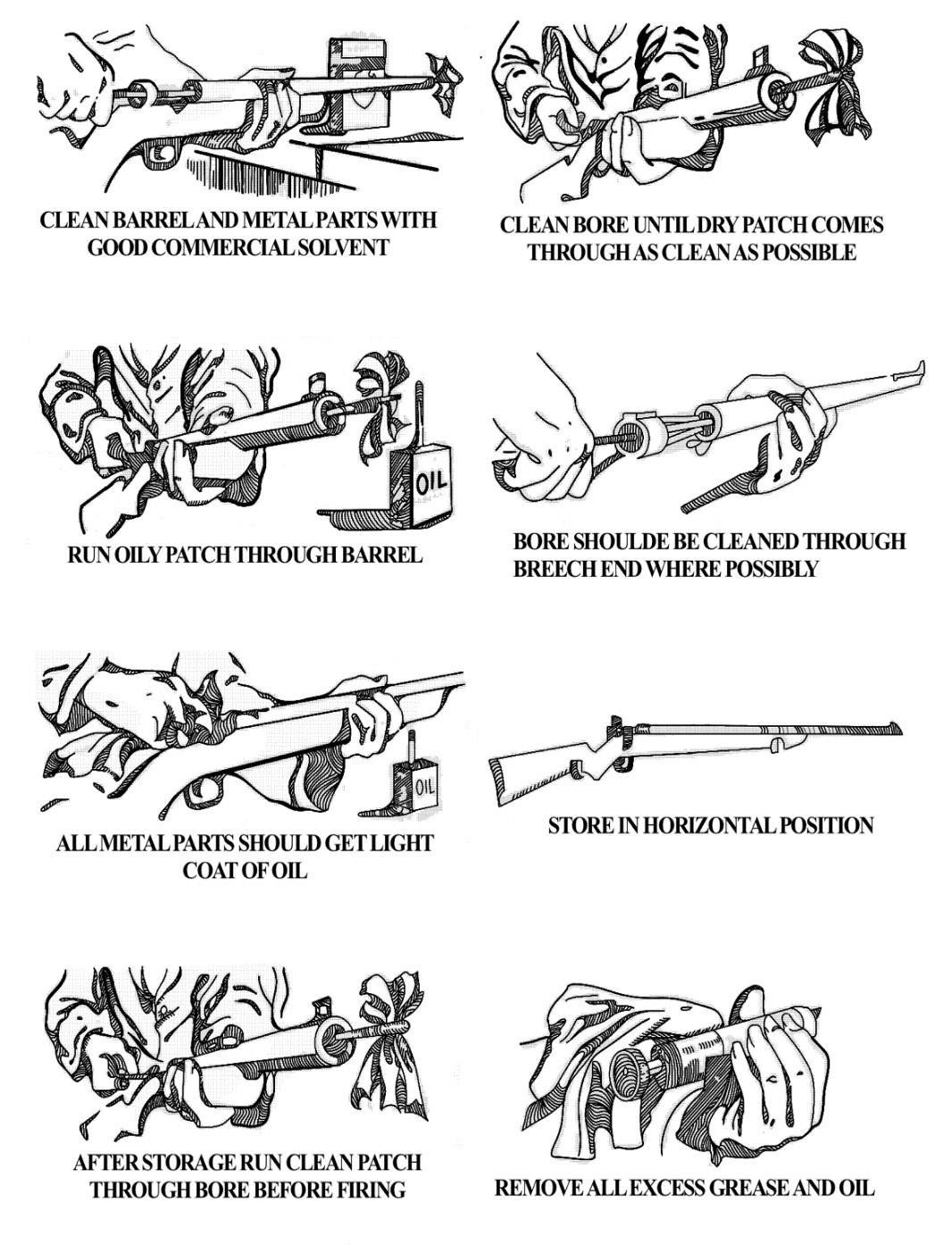
CLEAN BARREL AND METAL PARTS WITH GOOD COMMERCIAL SOLVENT
CLEAN BORE UNTIL DRY PATCH COMES THROUGH AS CLEAN AS POSSIBLE
RUN OILY PATCH THROUGH BARREL
BORE SHOULD BE CLEANED THROUGH BREECH END WHERE POSSIBLY
ALL METAL PARTS SHOULD GET LIGHT COAT OF OIL
STORE IN HORIZONTAL POSITION
AFTER STORAGE RUN CLEAN PATCH THROUGH BORE BEFORE FIRING
REMOVE ALL EXCESS GREASE AND OIL
The next step is: learn to disassemble and assemble your pieces. Also care and maintenance. Due to the fact that self-defense activity will not be limited to daylight hours you should learn to break your piece down and assemble it even in the dark. Your life depends on it. So do it....
After you’ve gotten this down, the next step is to learn how to aim and fire your weapons properly. All of this is to be done before you ever put your first round of ammo in the chamber. The first thing to deal with is proper sight alignment. Sight alignment is lining up your front sight with your rear sight correctly. Your front sight lined up with your rear sight and both lined up on target is called the “Sight Picture.” The correct sight picture basically is having the front not too high or too low, not to the right or the left, but having the target resting on top of the front sight. The sight picture will not always appear perfect, but if the correct sight picture is understood practice will bring improvement.
The next thing to get down is: Trigger Squeeze. That’s right, you squeeze the trigger. You don’t pull it or jerk it, contrary to whatever you saw on T.V. trigger squeeze is the process of putting slow steady pressure on the trigger until a shot goes off. If you try to anticipate the shot, you will jerk and mess up your aim. One other thing to watch for is: Movement of your piece which comes from breathing. Which also messes up your aim. One method of breath control is: take a deep breath, let out half of it, hold the rest of it, then begin your trigger squeeze.
One thing to guard against is flinching. Flinching is caused by being intimidated by the sound and kick of your weapon. With proper trigger squeeze and breath control, you won’t have any problems with flinching. If you have problems keeping all your shots in a fairly small group or if you have a problem just getting your shots on the target anywhere you are probably flinching. Have someone watch you as you fire, and they will be able to tell you whether or not you are flinching. It would be ideal if you could incorporate into your group a veteran of the pigs’ military service. Veterans are of great value and assistance in helping with the above training, also when you are ready to begin practice with live ammunition. When practicing with live ammo make sure your location is where you won’t be hassled by pigs. Actual combat conditions can be deadly as a training ground. When practicing with live ammo remember: it is valuable. Don’t just start popping caps for the hell of it. The whole purpose is to prepare yourself to be a “match for one hundred” which will only come as a result of correct practice.
“In military language, tactics are the practical methods of achieving the grand strategic objectives. In one sense they complement strategy and in another they are more specific rules with it.”
-- Ernesto “Che” Guevara

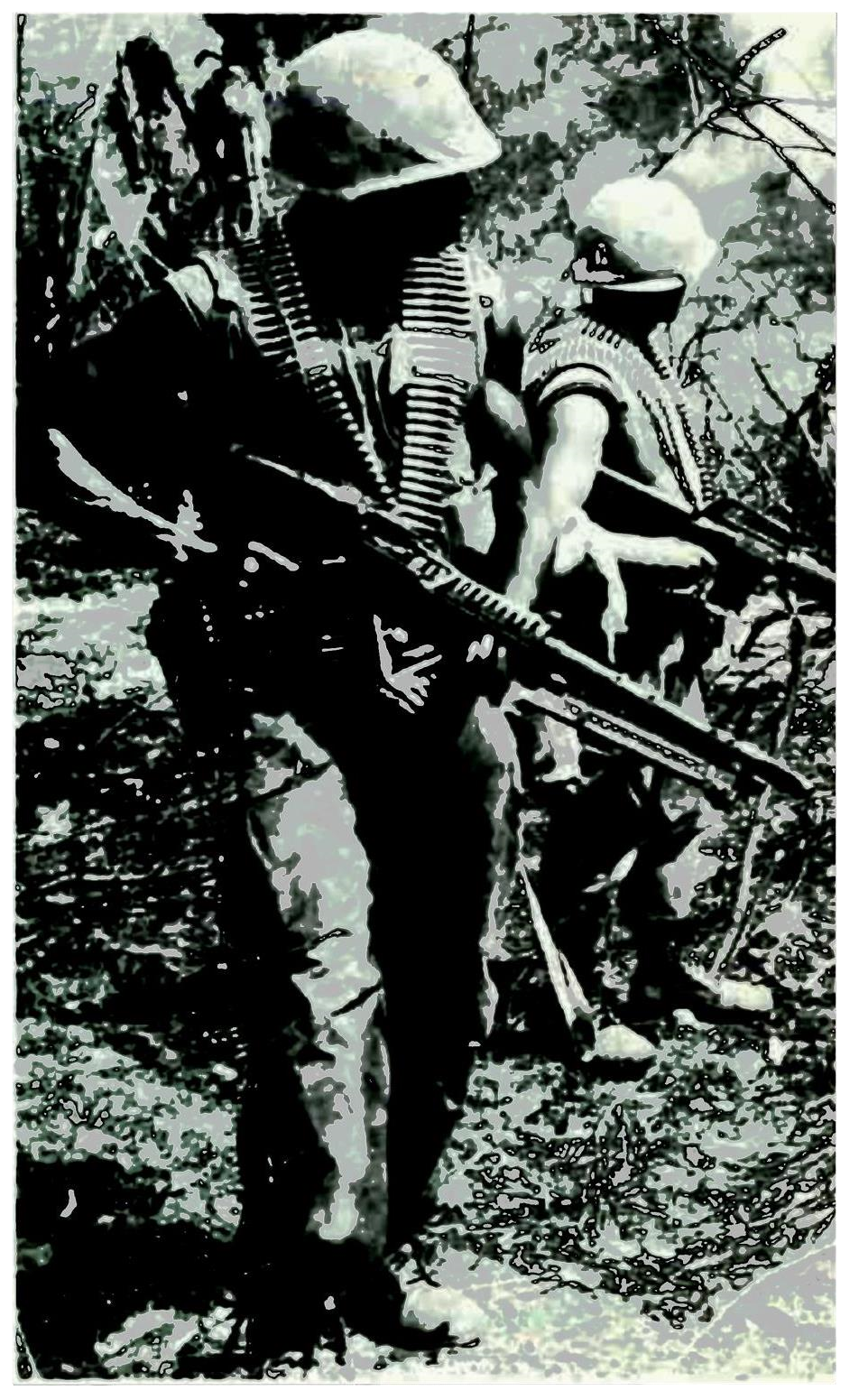
A WORD TO THE SIBLINGS IN THE
MILITARY
If you check the history of the United States since the pilgrims landed at Plymouth Rock, you will see that black people have played a part in every war that the United States has engaged in. In every instance, when blacks were armed and sent into battle, it was in the interest of those in power, whose interest it was to keep niggers in their place. After each time that Blacks were used as cannon fodder and the particular dispute was over, the Blacks were disarmed and sent back to a life of suffering and deprivation. The very things blacks were told they were being sent into battle to safeguard, such as freedom and democracy, have been historically denied to black people. This includes the present war of Genocide that is being waged against the Indo-Chinese people. It is also interesting to note that in more than one instance, when the bodies of Black siblings that have been killed in Vietnam have arrived in their hometowns the racist dogs would not allow them to be buried in the local cemetery. A whole book can be written on how we and the Vietnamese people have been victimized by this cruel and barbarous war that is perpetrated in the interest of the ruling clique of swine in Babylon.
I appeal to all of you siblings in the pigs’ military, and I appeal to all of you that have parents and/or relatives or friends in the pigs’ military to encourage them to do the same, to come home. You are needed at home to wage war against these lying pigs in the name of freedom and liberation for yourselves and all oppressed people. Do not let the pigs disarm you this time. Keep your weapons. Bring them home. If you check and see what the pigs are doing to black people right at home, you can see that you need everything that you can get. We need everything that you can get.
If you can get a tank, get it. In the meantime, while you are still in service there is plenty you can do. You don’t have to wait until you get out. Turn your weapons against your racist officers. Destroy as much of the war machinery you can get your hands on. Blow up trucks, airplanes, especially helicopters that they have begun to use when they attack us right here in Babylon. Blow up communication machinery, blow up fuel dumps, ammunition dumps, blow up everything that can be used against any people anywhere. One of the most important things you can do is supply freedom fighters from among the people with weapons.
We need sub-machine guns, hand grenades, plastic explosives, some of those nice compact rocket launchers and bazookas, also we need all the ammunition you can get. We need any type of weapons that we can use in our war of true liberation, that has already begun. As we have seen in the past, you siblings in the pigs’ military are in a very strategic position. Don’t let them disarm you and send you home empty handed this time. You have picked up the gun, willingly or not, for the same racists that send you to jail and won’t give you a job. So, keep the guns and use them for your and your people’s benefit.
Also, when your unit is sent into some community to put down the people, turn your weapons over to the people. It would be even better if you helped them fight. Here I will quote Eldridge Cleaver, the Minister of Information of the Black Panther Party: “You are either with your people or against them, you are either part of the solution or part of the problem, we either help our people or, by refusing to help them make it easier for the enemy to destroy us, there are no two ways about it, either quit the army now or start destroying it from the inside.”
“Wherever death may surprise us. It will be welcome, provided that this, our battle cry reach some receptive ear, that another hand reach outto take up arms and thatother men come forward to intone our funeral dirge with the staccato singing ofthe machine guns and new battle cries of war and victory.”
-- Ernesto “Che” Guevara
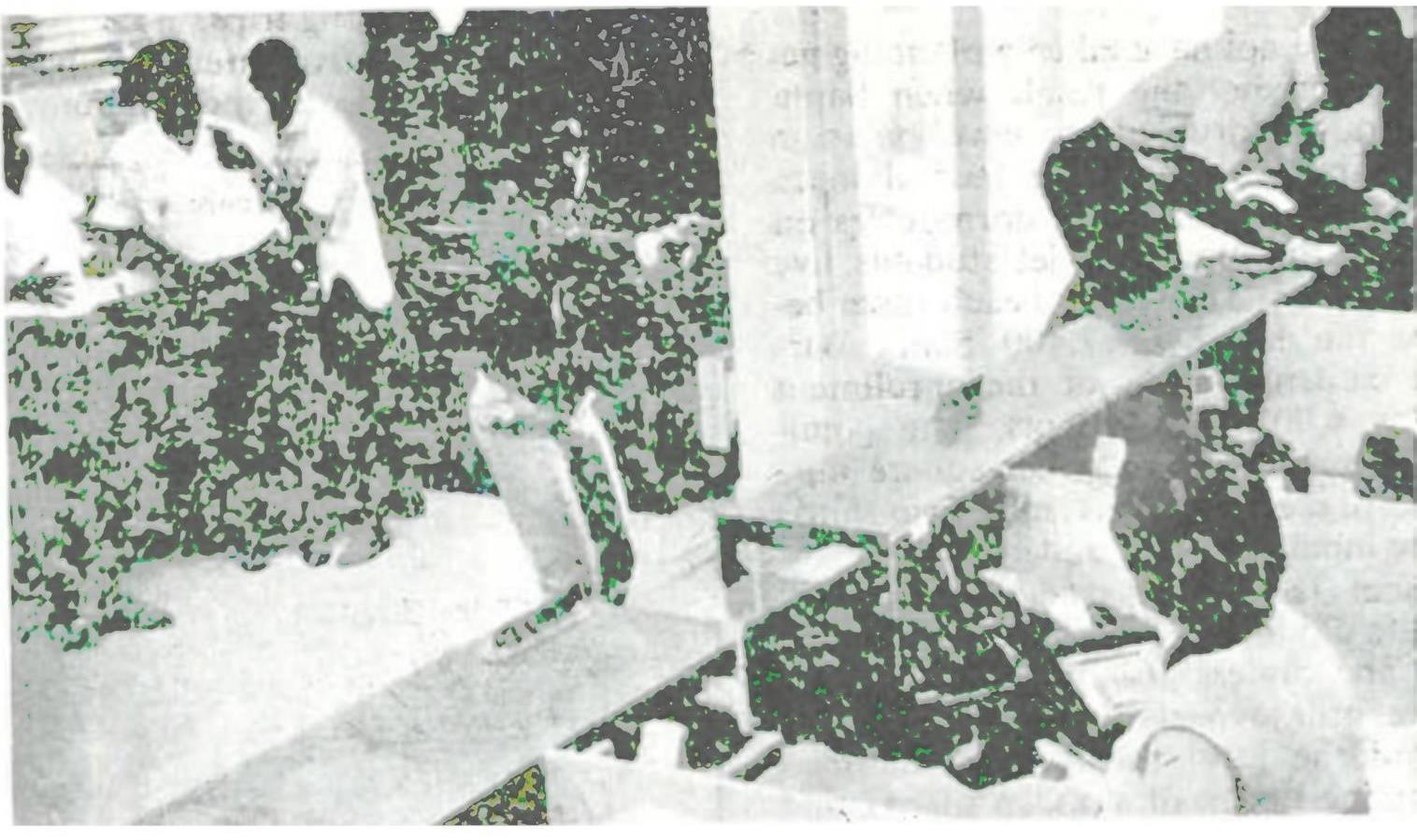
FUNDRAISING
I would like to say a little here about fundraising. The growing number of political prisoners and prisoners of war, their families and the families of our fallen comrades must be provided for in addition to everyday needs of the fighting units. So, this must be provided for.
Due to the level the struggle has reached I am doubtful if the traditional means of fundraising can provide all the necessary funds to meet all the needs of our struggle. All such efforts must be intensified. However, those funds raised by traditional means must be augmented by funds raised by other means. The means of armed attacks upon financial institutions for the purpose of taking back the profits of the World Slave System. There should be no places where the pigs keep their stash that are safe from attacks by guerilla units for the purpose of fundraising. Because we have used this method traditionally and most of us are used to this type of activity, I feel it necessary to issue a warning that this type of activity should not be taken lightly. The same amount of planning must go into fundraising as a unit would put into assaulting a police station. The pigs’ C.M.I. covers all spheres and must be accounted for when planning any revolutionary activity.
HOW WE MUST INITIATE ARMED
STRUGGLE WITHIN AN URBAN
GUERILLA CONTEXT
Since the year 1619 when the first slave ship landed with Human cargo from Africa to toil as slaves in the New World, innumerable methods have been used to gain our freedom and liberation. From praying and begging to insurrections. From sit-ins to riots, and now we are witnessing the birth of the Urban Guerilla.
Throughout this history, and along with all of this activity, there has been an overabundance of rhetoric. Our people have been talked to, lied to, tricked, begged, and cajoled in trying all kinds of fruitless methods to gain freedom and liberation. There are even those who have tried to make armed struggle and revolution palatable through rhetoric and con games.
Imagine, trying to con the masses into picking up the gun to wage an armed revolutionary struggle against the most barbarous power structure in all history!!! This is the way of cowards, advocating for the masses what they themselves are afraid of. This will not do. What is required is correct examples and continuity.
The overall strategy must be to organize those forces, ready to get down at this time, plan tactics, make preparations and then launch an organized attack upon the power structure. This will in turn educate and mobilize the masses and lastly bring about the day when enough of the masses see the validity of armed struggle. They will begin to use it to bring an end to the evil system of World Slavery headed by the racist power structure of Babylon. This is the overall view. Initially the revolutionary forces must be organized in such a way as to provide the maximum security possible without creating machinery so cumbersome that it’s nonfunctional. Material resources must be obtained to support and sustain the existing forces. While these preparations are being made, political education and training must be intense. After this machinery is together then begin to initiate action.
The following is a partial list of things required to sustain guerillas operating in urban areas in Babylon:
-Money
-Arms and Munitions
-Red Areas (Bases)
-Transportation
-Communication
-Information and Propaganda
-Security and Intelligence
-Training
-Political Education
-Medical Needs
-Method of Recruitment
-Logistics of Material Resources
Tactically, in order to firmly establish armed struggle as a tool the masses will accept and use, actions must be within a context they can relate to as being in the service of their needs.
Example: Whatever mass actions are going down in the community, armed actions must go down in support of these actions—say there is a mass activity in a community around the Welfare issue, the development of this struggle must be followed closely and at the proper time armed actions must be initiated in support of the particular demands.
In order not to end up operating in a vacuum while doing large actions the masses can only relate abstractly, actions must be planned in support of their day-to-day demands. We must always keep our goal in mind, which is to educate the masses to the fact that armed struggle is the only real way by which and end can be brought to the bullshit the pigs are putting down, and as enough of the masses join us, we can finally deal the decisive blow to rid the planet of all evil gentry.
This brings us to what we will call Propaganda Actions. These actions will be of such a nature that they will receive nationwide coverage through the pigs’ news media, e.g., political kidnappings in exchange for political prisoners and/or other demands. These actions will give guerillas the opportunity to speak in their own name and put forward their program. The first such action can also be used to inform the people and the pigs of the guerillas’ existence.
Don’t waste time on polemics with other organizations. Let those who disagree, disagree. I say the only laboratory to test ideas is practice.
Those with ideas that others do not agree with can only be proven correct or incorrect through actions not rhetoric.
We either seize this moment in history and step into the world stage of armed revolutionary struggle against all oppression and exploitation or we turn our backs on our historical task and leave the masses struggling and stumbling on the darkened path. The path darkened by 400 years of the most barbaric treatment of man by man in all history. Understand me!!! The struggle will continue. But at this time, we have the power in our hands to speed up time. It is time for all of you who have something to teach, teach by example on the battlefield, to step forward, and need I remind anyone that “The duty of a revolutionary is to make revolution”.
D.C.
Part 2: “Long Live The Revolutionary
Spirit Of Field Marshal DC"
An Interview with Donald Cox, former Field
Marshal, Black Panther Party on 3/31/92
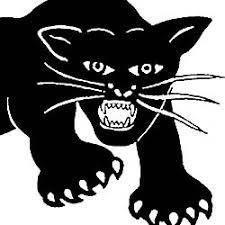
By Safiya Bukhari
Q: Would you tell us a little about your background, and why you joined the BPP?
A: Well, I was born and grew up in Missouri and all those cornfields and whatnot. So, I was really just a ‘country nigga’, you know? Not intellectual, not knowing anything, really. I arrived in California 17 years old in ‘53. Of course, like all Black people who grew up in the United States at that time, I was aware of the oppression of Black folks and all of the lynching’s that We were hearing about every now & then at that time. After the Supreme Court decision in ‘54, I was sitting at the table with an uncle & aunt that I was living with. And he was saying that was a very historical decision that We were witnessing. Of course, at the time I wasn’t capable of understanding the implications of what that meant.
Soon after, Little Rock & all those events began. Now, out there in California I wasn’t feeling directly touched personally but feeling touched as a Black person in America. And really understanding that that was part of me too. But it didn’t go much further than that. Then you have incidents such as the Emmett Till lynching and I felt very sensitive about that because We weren’t very far different in age. Then there were the Montgomery Bus Boycotts and then the Freedom Rides - all these things going on and it just looked to me like things were really really beginning to move, but in the south. And then the Church bombings and the civil rights demonstrations began. I had a little problem dealing with the philosophy of non-violence. I just at that time couldn’t imagine myself being spit on or abused physically without doing anything.
So, for me personally at that time, I wasn’t attracted to dealing with any non-violent actions. Although the fever of the Civil Rights movement actually arrived there in San Francisco. And with all the bombings & brutality of the demonstrations and such, that finally I reached the point where I wanted to do something. So, I joined the group that seemed to me like to be the most militant thing in San Francisco, which was CORE, the Congress of Racial Equality. And We began to prepare & make demonstrations against real estate agents that discriminated against Blacks and whatnot. First, We would send a Black person in to ask for a particular place that was for rent or for sale. Naturally, they would be refused and then a white member of the organization would go in and naturally, it would be available to them. So, We began to boycott & picket those places. And the Cadillac dealer, where in San Francisco at that time, 75% of all the El Dorados that were sold were bought by Blacks, but there were no Black salesmen. So, finally with those demonstrations We began to get some token advances. But I noticed right away, even with my lack of political maturity, that whenever like at the Cadillac place whenever finally they broke down & started giving jobs to people, it was always jobs for people in the community that was already kinda well off in the sense that they were—bourgie! In other words, it wasn’t the people that were really down & out that were benefiting from the advances. So, I really didn’t understand too much politically what was going on, but I just didn’t feel satisfied; so, I just started leaning back. That was around ‘63.
After the Civil Rights March on Washington and— the thing that really broke my back, two weeks later— the response in Birmingham when those 4 little Black girls were killed in Sunday School [during] that church bombing. That just blew my mind. I just felt a total impotence. I felt impotent & frustrated; wanted to do something, but not knowing anything. Really, I wasn’t an intellectual, I hadn’t done any reading, I didn’t even know what revolution meant at that time. But anyhow on my job, I worked my way up, & finally I became the boss. As soon as I became the manager where I worked (the owner owned several corporations, We were only one), I had meetings with him once a week to go over the books. The rest of the time I was on my own. So, once I got to be the boss, director of the place, I knew I was gonna correct all the injustices my co-workers & I had been working with all these years. To get them raises everybody deserved & whatnot. But as soon as I started talking about that, he starts talkin’ ‘bout, “Whoa, whoa; hold up! Keep the prices down, pay the minimum amount of wages & charge the maximum for the products.”
So, through this process on my job, I became conscious & aware that it was the system that was wrong. But like I said, not having done any reading, not knowing what revolution was about, I didn’t know what to do about it. But I understood fundamentally through my work, that it was the system that was all wrong. And by that time, ‘65 had rolled around, I was hearing Malcolm X & people on the street corner like Don Warden in Oakland at the time, talking about ‘Black’ & all that and all the things that I had never heard of before. And it sure made sense to me, so I used to go down to the park every weekend to hear him talk. Then the mosque opened up there in San Francisco, so I used to go down there every once in a while, to hear what they were saying, go by the restaurant. And this Black consciousness slowly began to take root in my head, but still, I didn’t know what to do.
Well, finally the Long Hot Summer started. Seeing Watts going up in flames on television; that really stirred up some positive emotions: “Finally, finally! niggas are striking out!” It was based strictly on emotion, not based on any kind of political analysis or understanding really what all those implications were. But I felt good seeing people striking out. Then the next year, a policeman killed a young Black on Hunters Point, who was only about 11 years old, he shot him in the back. So, the youth up there started going out on riot too, and it finally spread into my neighborhood there in Fillmore. Well, I was going to work every day in my shirt & tie, a halfway bourgie nigga at the time. So, I wasn’t really participating, but I was just out on my stoop watching the little youngbloods running through the neighborhood getting’ away from the policemen.
And then I began to hear about a group over in Oakland, called the Black Panthers. With guns—I didn’t know anything about ‘em, didn’t know what they were talking about, but the word started going around a bit. And finally, there was an article in the San Francisco Examiner—at the time they showed a picture of Huey Newton standing up there with a gun. That was mind blowing, seeing that. So, I started asking around, but nobody knew anything about ‘em, didn’t know what they was. Finally, one day I walked into the job, and somebody gave me a copy of the San Francisco Chronicle and there on the front page was a photograph of all them niggas at the state capitol with guns! Well, I didn’t know what I was gonna do, but I wanted to find them dudes with them guns! a€~Cause to me, with all the violence that Blacks had been suffering from all this time, the idea of standing up and saying “We don’t want no more of that. If you shoot at us, We gonna shoot back!” That appealed to me. But I still didn’t know anybody.
Finally, I ran across a couple of youngbloods that knew one person that was there in San Francisco that was part of the Panther party—that was Emory Douglass. So, We found somebody that knew him to get him to come and talk to us and whatnot. We started buying the Panther paper and studying that. It so happened that the first issue We got our hands on, there was an essay by Huey Newton talking about the correct handling of a revolution.
For us there in San Francisco, not knowing anybody, not really being into it, We didn’t feel worthy of being in their company! We put them in such high esteem; so, We worked, started trying to organize and learn a little bit amongst ourselves about what was going on. By that time, Newark was breaking out, Detroit—We felt like the revolution was on, and We were behind time, so We were working to catch up. We wasn’t going over there to meet with those people in Oakland, ‘til We felt like We deserved to be in their company! But in the meantime, through our relationship with Emory, We got Huey to come talk to our group. And We really held him in high esteem and everything because of all the stuff they were doing in the street, you know facing off the pigs with the guns & whatnot. So, it was a little funny meeting him, and seeing that little pretty boy with that little high- pitched voice.
He didn’t fit the image of this bad nigga We had. And he talked so intellectual that We didn’t half understand stuff he was saying, but still, that didn’t change anything. But he saw how We was organized amongst ourselves with our guns and giving training courses to people on how to use them & whatnot. So, at that time there in the summer of ‘67, he started asking us to deal with anything that came up there in San Francisco where people wanted Panthers. At that time there wasn’t the Panther Party as it became known; over there in Oakland, you could get maybe a handful of people together that called themselves Panthers, nothing more.
So, some people in Hunters Point asked him to come over & talk to them, so he called us & told us to go deal with it. So, We went over & rapped; took our guns, showed people a few basic things, how to break ‘em down, and talking about safety rules & all like that. And We started doing that all around the different Black communities. San Francisco was small, but the Black ghettoes were all divided up—there was no one central one—they were divided up into about five: there was Hunters Point, Fillmore, and a couple more I can’t recall the names of. So, We started going around to one of these neighborhoods every weekend with our guns, giving demonstrations & whatnot.
Finally, We reached a point where a few of us felt like, “Ok, talkin’ is enough, We gotta get down to business” —About three of us, We found each other, and We planned a little operation. It was successful. And, not having any propaganda machinery around, We chose the anniversary of the date that the policeman had killed that young dude up on Hunters Point the year before. So, if the people didn’t really make the connection, at least the pigs knew what it was about. So, We did our first action on that anniversary, September 27, 1967.
Well, it was successful, so then We felt like—Now, We can go over there and talk to them people in Oakland. So, the next day We went straight to Oakland. We went to Huey’s house and David Hilliard was there and a couple of other people, but they were laying back, they weren’t talking much. We went to the restaurant, just sitting down talking. Naturally, We let him know what We had done, and he had seen the news and he knew about it. But to my surprise, he asked me “well, u know don’t you think that it’s better; rather than start moving—isn’t it better to work first to get the means to get organized and to get to moving?” Well, I didn’t expect that kind of a question, so all I could think of to say was “as far as we’re concerned, you got to use what you got to get what you need.” But anyhow, that was the beginning of our relationship with the Black Panther Party. That was in September of 1967.
Q: How old were you then?
A: 31
Q: How did you become the field marshal of the BPP?
A: Well, We didn't stop there. That was on September 27th, when we did that first action. Then, Huey went down & got wounded & arrested. That was in October, and We had decided that, like the Panthers there in Oakland, We wouldn't accept that anymore. We wouldn't let them move with impunity on people that We considered our leaders. So, We planned an action to retaliate for that. It was also a successful action.
Because of the things that we were doing there in San Francisco, one night a car came with Bobby Seale, David Hilliard, and I think George Murray. They came down to the neighborhood where We hung out, and Bobby said he wanted us to join the Party, and he wanted to make me a member of the central committee. So, I said, “Well, We as a group, We don't have any hierarchical structures; every time there's something that needs to be done, the one that knows the most about it does it. He's the one that tells us how to deal with it, so I'll have to talk to everybody and let you know.” Well, We got our heads together right then & there, and everybody said, ‘deal with it’. So, I told him, “Ok”. That's when our formal alliance began with the Party.
Because of my background with arms - I’m from Missouri, one meal a year coming from hunting - I had my first rifle when I was 8! So, when the thing started, I had an arsenal at the house. So, being able to train people, and knowing all the gun laws - them people didn't even know that you could legally go down and buy all these guns & whatnot - I started dealing with that. So, I didn't have a title yet.
Then they had a meeting to get a little bit better organized, around the time we were going to have the rally for Huey's birthday in 1968. That's when Stokely, Rob Brown, James Forman, and all those people came out. And the merger with the Panthers & SNCC went down. Now, as far as SNCC was concerned, they needed to get some more legitimacy because We had taken the thing to a higher level than them; for us, the Panthers, We needed to get ahold of a national network, so that served our interests on that level. So, we had a meeting and We defined more precisely the central committee at that time, which was naturally Huey, Eldridge, Bobby, David, Kathleen, George Murray, Emory Douglass, Masai Hewitt & myself.
At that time, I received the title of Field Marshal. But because I was still going to work in my tie & suits & whatnot during the day and doing those other activities at night, I said that to continue to be effective, I don't want that to be known publicly. So, if you find any of those old Panther newspapers, you'll see that in the beginning, every time you saw ‘field marshal’, it was written 'underground'.
Q: What were some of your responsibilities as field marshal?
A: Well frankly, it was strictly on a military level; procuring guns, and teaching people how to use them. And, because a lot of people are still out there today, I don't want to go into any more details like that. But it was strictly on a military level.
To buy handguns in California, you had to go through the police and wait two weeks & get a report. So, because almost everybody had been busted and didn't have a right to handguns, I used to go to Nevada & buy them. Because there, you could buy 'em over the counter like cigarettes. So, I'd collect money & go there and come back with trunk loads of guns.
That worked alright until Bunchy Carter's brother got caught in an ambush in Los Angeles, Arthur was his name; he was the one who introduced that phrase, 'Right On' in the party. All the time, Arthur was sayin' 'right on, right on!', and everybody picked up on that. But anyhow, he got killed; he got a full blast from a twelve-gauge shotgun, but before he died, he offed the two people that ambushed him, and the pistol that he had was one of those that I had been buying.
So, when they traced it, and saw the store records of all the guns that I had been buying, they made scary headlines there in the Bay Area, talking about
Panthers stockpiling guns. And there was even a Black congressman in the State Assembly that was a bootlicker at the time - I don't know how he evolved - his name was Mervyn Dymally. He stood up in the congressional house and read into the record all the numbers of all the guns that I had bought, as if it was a crime for Black people to arm themselves to defend themselves against all that police violence. So, my activities at that time really were dealing with things on a military level.
Q: We often hear of the BPP referred to as a paramilitary organization; is this a correct description and if it is a correct description, what was its structure & chain of command?
A: You see, in the beginning, because of all the police violence when Huey & Bobby & Lil' Bobby took to the streets with their guns, they concentrated on point #7: ending police brutality & whatnot, in the community. The program had ten points, but that was the priority for us because of all the violence that was going on. So, that gave it more of a military appearance; and the fact that the gun laws in California permitted us - it was legal for us to be out there with those guns like that. That gave us an image of being a little bit more adventurous than we really were. We'd go in the police station with our guns, and it was legal, and they couldn't do anything about it. But, when they started working on that gun law, to stop you walking around with the gun loaded, that's when the Panthers went to the capitol with the guns in California.
So, in that sense, it was because of the military situation of all the repression & violence against Black people. The chain of command of the Panther Party and the titles more or less, were like a military organization. Or, like a lot of revolutionary governments in the world: Huey - minister of defense, I was the field marshal, David Hilliard was the chief of staff; but also, there was a minister of culture: Emory Douglass, minister of education: George Murray, communications secretary: Kathleen Cleaver, minister of information: Eldridge Cleaver.
So, in the beginning, emphasis was placed on point #7, with the police patrols and all like that. In practice, even though the organization was not a paramilitary organization, in fact, it really had that appearance - initially.
But then, after Huey had gotten busted, the few of us that were there in the Bay Area got together the next day and We know that with one policeman dead and another wounded, they're gonna try to put Huey in the gas chamber. We don't know what to do, but We gotta do something to keep them from sending Huey to the gas chamber. Immediately, the Huey Newton Defense Committee was created, and Eldridge Cleaver (despite what he became later) went to work. And that - the pressure group to keep them from sending Huey to the gas chamber - became the Black Panther Party as it became known around the world.
We started organizing, trying to get as many Blacks together as possible. Getting guns; it wasn't a real well-disciplined organization at the time, 'cause some people started doing all kinds of crazy stuff - cheap, nickel & dime robberies, intimidating people & whatnot, but still it was growing like wildfire.
By April, when they assassinated Martin Luther King, and those 150 cities burned overnight, our level was a little bit higher at that point; We kept people from going out and just doing spontaneous things, but there were still a few little things that went down. We more or less managed to keep things under control.
But Eldridge Cleaver felt the need to move, and he really didn't have any military experience, you see; he was the minister of information. So, he just gathered up a whole bunch of people and everybody was armed, and they went out in the streets, riding around in cars. I don't know the details; all I know is that some police cars showed up. Shooting started, niggas was runnin' in all different directions, and Eldridge and Little Bobby got cornered off into a house. We all know that history - they stayed in there for about an hour, hour, and a half with all that teargas & everything - they couldn't get 'em out, because Lil' Bobby had a M-14, and there was a little alleyway, they were on the ground floor. To get to them, anybody that comes in that little alleyway, they gonna get blown away; so finally, they just set the house on fire.
At that point, well they had to give it up - they had to come on out. But Eldridge, knowing how the pigs was, he stripped down naked. See, he had been wounded in the foot, he told Lil' Bobby to do the same thing, but Bobby only took off his shirt. So, with all that gas, for an hour and a half with no gas mask, you can imagine the shape they were in; plus, Eldridge being wounded. So, they went stumbling out of there, and Eldridge being wounded on the foot, he fell and Lil' Bobby stumbling, and one of those racist police yelled, 'He's got a gun!', and they opened fire on him. I don't know how many times he was shot, maybe fifty times; it was really terrible.
It was just out-and-out murder, as everybody knows. And the house looked like swiss cheese, all the bullet holes that were in it, it was one of those old wooden houses where bullets was just goin' right through it. Since they was down on the ground floor in the house, they really hadn't gotten touched. But they blew Lil' Bobby away outside.
Q: You left the U.S. and went into exile in 1970. Can you tell us what the conditions were in the streets and within the Black Panther Party at this time?
A: Ah, things had really evolved by that time! More or less, the struggle had left the streets and gone into the courts. Because frankly, after the campaign to free Huey finally reached the trial and they didn’t send Huey to the gas chamber, and Charles Garry (who was the lawyer) said that he would be out in two years. All of a sudden, you got all this machinery that’s moving across the country for the sole purpose of freeing Huey & keeping him from going to the gas chamber, and We didn’t know what to do with it! We were passed by the events, because people just overnight was moving all across the country in the name of the Black Panther.
So, We decided to go into retreat, and started going into political education trying to find a tool to help us deal with organizing all of that. And I’ve never known to this day where it came from, but the first thing that came out for us to study was ‘The Foundations of Leninism’, by Josef Stalin. And as far as I’m concerned, that was the beginning of the end, because that was the book that was used to turn the emphasis from the struggle to the party. Instead of the struggle for the liberation of Black people becoming the most important thing, it was the
party that became the most important thing. Then the democratic centralism, and all that Marxist- Leninist paraphernalia that most of the organizations calling themselves communist was based on. But the so-called central committee, and I’m gonna tell the truth, was David Hilliard at that time. Because Eldridge had already had to go into exile in December, Huey was in jail, and Bobby had charges against him. But they were making decisions by themselves.
We didn’t really have those central committee meetings, with the democratic centralism where things were voted and then passed on down. Personally, myself, I didn’t know what to do, I was going along with that, ‘cause I felt that the party was the only means to deal with that situation at that time.
But slowly, in April, that’s when the New York 21 got busted, and I made a trip back there with David Hilliard and whatnot. I saw that the party had just fallen apart. Because of the repression back there, David Hilliard wanted out; he wanted to get back to Oakland the next day after We dealt with what had to be dealt with. But I saw what the situation was like, and I decided to stay there and try to re-organize and get the party put back together. The bust had just gone down in New Haven; that’s why We had met there in New York. The party in New Haven didn’t even exist anymore. So, I stayed, and they got on the first thing smokin’. Robert Bey was so scared, he sat up in the house all night with a pistol in his hand until it was time to go to the airport to catch the plane. They wanted to get out of New York, as far as they were concerned, it was too dangerous. So, they went back to California, and I stayed in New York.
The party in New Haven didn't even exist anymore. So, I stayed, and they got on the first thing smokin'. Robert Bey was so scared, he sat up in the house all night with a pistol in his hand until it was time to go to the airport to catch the plane. They wanted to get out of New York, as far as they were concerned, it was too dangerous. So, they went back to California, and I stayed in New York. So, I started moving to get the party re-organized.
The fascism conference was coming up in Oakland, and We were working, organizing people around that, and using that as a mobilizing tool. So, the party started coming back together there on the east coast. Philadelphia, New York, New Jersey, and then finally We got enough cadre where I could take people from different chapters, and We went to New Haven, printed up some leaflets and passed them out, held a rally and opened up a new party overnight. Because those people up there had been abandoned.
It was necessary to work and start getting attention to their case & getting them out. We just took people from all over & put Doug Miranda in charge, and they started with that. Now how things evolved, structurally, I don't really know, because finally the police figured out a way to get rid of me & cut my wings.
I had gotten busted in Richmond CA back in the summer of '68 because they had a riot, and I had gone over there to observe. Now actually, I never moved without my guns, you know. So, the curfew was at 9 o'clock, and they had been watching me all day, the California Highway Patrol. So, when it was time for curfew, me & a couple of other dudes were gonna go into the house; as soon as We got to the house they came from everywhere and vamped on me, and actually they found my piece.
So, I got busted for having a gun and then they put charges on me being an ex-felon in possession of a firearm. That was another felony. I had been busted when I worked for the post office because I ripped off a little money from the mail. I had gotten probation for that, but anything dealing with the post office at that time was a federal charge. It wasn't considered a misdemeanor, so I was considered an ex-felon, even though I had only got probation - it was very minor, something like $50, but that was on the record.
So, they used that as a technicality, to vamp on me there in New York, being an ex-felon in possession of a firearm to test some new law they had made there in congress. I was confined, I couldn't move anymore around the country. Because I was living in New York at the time, I could only go to New York, but the charges were put in California, so I had to go to there for court. I could only go to New York & California. So, when I went back to California for the court trial, that gave David Hilliard & his clique a chance to take over back on the east coast. Because by then, things were organized, you see.
In the beginning, they was afraid to even go there, but by then with things being organized, they sent their people in to take over. I’m going to trial and whatnot, things were dragging out, but then the Baltimore case came down. They had found a police informer, the police had sent him in to the party, but he showed his hand two or three days after he had gotten there.
They dealt with him. But, because I was responsible for the east coast at the time, when they came out with the list of the people, they were gonna vamp on, my name was at the top of the list. I received the word on April 16, 1970, which was my 34th birthday, so I got hat. I disappeared that day. Now, I stayed there, not knowing really when things were going to go down, but I went underground immediately. But two weeks later around the 31st of April, they started kicking down doors looking for me, so it was at that time that I split. I had already been working trying to get people to go to Algiers to help out to set up the international section. Sekou Odinga and Larry Mack had been underground for some time, over a year, and they needed breathing room because there was no underground apparatus at that time. So instead of taking people off the street that We needed for street work, it was decided that Sekou & Larry would go there.
So instead of taking people off the street that we needed for street work; it was decided that Sekou & Larry would go there. My thing came down in the meantime, so We all went there; Sekou, Larry & myself. Now, We didn't have no travel arrangements at that time, We weren't proficient in producing false papers at that time, so Sekou & Larry had to take a plane. They landed in Cuba; it took us a couple of months to get them there. It was a coincidence; they took the plane the same day I left the states. I arrived in Algiers on the 5th, and they arrived in Cuba about the same time. I think it took Eldridge & I almost two months to get them out of there. It was almost July before We got them to Algiers. But anyhow, We all finally got together, but in the meantime, the government had given us an embassy.
The revolutionaries in Vietnam became a provisional government, so they gave them a normal governmental embassy, and they gave us their old embassy that they had when they were the National Liberation Front. In the meantime, Eldridge was leading a delegation of anti-imperialist forces to Korea, so he left. Sekou, Larry, myself, Bill Stephens,
& Connie Matthews were left there in Algiers, and We remodeled the villa to create an embassy with plaques out front and everything. Fortunately, We were able to get it together just in time for their return.
They came back on Friday, September 13th, and We had the official opening on the 15th on September of the International Section of the Black Panther Party. So, my exile was really a continuation of work. I didn't feel like I was losing anything because as far as I was concerned personally, I was at war - it didn't matter if I was in or out - work was gonna continue.
Q: What kinds of thoughts were going through your mind when you made the decision to leave the United States?
A: The only thing, frankly, that I was thinking about was keeping them from catching up on me. I wasn't gonna give them a day for anything. My whole thing was to get away from their grasp; they was kickin' in doors all over the place. So, it was funny, you know, because I went into disguise, and I had to go into the federal building to get a passport. Now, they're out there kicking down doors, the passport office is on one floor and the FBI was on the next floor and I’m right in there gettin' my false passport! I managed to get it within 24 hours, and I got hat. My only thing was to get away from them.
Now, I’m gonna tell you also, I felt a little relief, because the Panther situation internally, had become untenable with David Hilliard and his clique. I didn't agree with the way they were taking things. The old emphasis of armed defense & whatnot was just totally squashed, and they were not wanting to deal with anything anymore that would attract attention of the police, and as far as I was concerned that was not what the Panthers represented.
I wanted to resign; I had written a letter of resignation for Huey, but I hadn't given it to him yet. Sister Barbara had the copy, and when that thing came down on me, frankly I was relieved. Because that allowed me to get out of there without being branded a traitor or renegade as they would have done in that newspaper as they did with anybody that didn't agree with them. So I was able to get out of that hell there without them smearing me across the country with that newspaper saying I was a renegade & whatnot and that allowed me to continue to work outside, so really on one level, it was a relief for me.
Q: Did you know what to expect, and did you know where you were going?
A: Oh yeah, I knew I was going to Algiers. What to expect? No, "cause I was full of illusions. After all the times I had seen the film, "Battle of Algiers", I thought I was going to a revolutionary country, where everybody was revolutionary & whatnot. So, really it was a contradiction, "cause when I got there and started seeing graffiti written on the walls and seeing the name "Elvis', I didn't really understand what that was really all about! But the atmosphere was very good, because the OAU had a liberation committee where they supported liberation movements and Algeria was the host country. So, at that time in 1970, there were representatives of struggles of people from over 90 countries there.
Being within that diplomatic atmosphere, revolutionary atmosphere, that was very good & very positive. But there were contradictions in terms of the Algerian society being revolutionary in the beginning - I didn't understand what was going on. People loving the French & whatnot; I couldn't understand that, after all they had been through.
Q: When was the International Section of the Black Panther Party established, and how did it come about?
A: Well, like I say, the official opening was September 15, 1970, and it came about because the Panther Party had international recognition at that time. Really, there were some inequalities because of that, because We were considered the favorites of everybody. There was no liberation movement in Algiers at that time that had an embassy, except us. Even the people that were waging armed struggle - all the Portuguese colonies, Angola, Mozambique, Guinea Bissau - even those people didn't have an embassy. They were working out of apartments & whatnot. So, that caused some resentment. We weren't aware of it at the time, but the privileges that We were being given were because people respected us for dealing with the beast from the interior.
We were considered heroes, maybe much more than what We deserved, and We didn't really realize it at the time. So, We created a lot of resentment without really knowing about it. Like, We're just niggas off the street, [and] We're lookin' for a place to have an embassy because they hadn't given us one yet. So, We're lookin' around with real estate agents, they show us a place, it was big enough to put an office upstairs, We could live downstairs, so We rented it and paid a year’s rent in advance. Well, We didn't know, but it turned out to be in one of the most bourgie neighborhoods in Algiers! But for us, with our standards from the United States, it didn't seem like that way to us, but We found out later that it was.
We needed cars. Well, if u see old French cars - the R16, and things like that - they were the kinds of cars that in the "States, We wouldn't be caught in! You know, I was driving a GTO, with a 450 cubic centimeter inch engine in there, with 4-on-the-floor when I left the states. So, driving an R16, for me it was almost like a Model T. So, We rented two of them to have enough transportation. But it turns out, that was a car that everybody down there dreamed of having! It was one of the leading cars that you could have. So, a lot of mistakes were made on that level, on our part from being just totally ignorant, but We needed transportation, and that was the biggest car that We could find. Even though it didn't meet our American standards, it got us around.
We didn't realize the resentment that created in other people's minds. Like having these two R16s, having a villa in Hidra, then by that time, they had given us the Vietnamese embassy, so We had an embassy of our own. Later, I found out that people were saying, "oh, they're not revolutionaries, they're bourgies - they're bourgeois people." Can you imagine calling Sekou Odinga, Larry Mack, Eldridge Cleaver & myself bourgie people? (laughing) But those were mistakes We made for not understanding the situation.
But then, too, We weren't like other people from the other liberation movements. They just sat around waiting for handouts. The OAU gave every liberation movement 2,000 dinars a month to live on. You can't live on that! It was symbolic as far as We were concerned; We dealt with our own needs. Eldridge used a lot of the money from the book he got; plus, there were support committees working in Europe. So, We dealt with ourselves without asking anybody for anything, and they wasn't used to people moving like that, and that created resentment too.
We dealt with whatever We felt like had to be dealt with at the time. We're not in no struggle for people to tell us what to do. So, on that level We made a lot of mistakes on the cultural level, not taking into account the cultural differences - We were ignorant to all that. We were just being ourselves.
Q: What were the functions of the International Section?
A: To disseminate information about the Party all over the world, doing as much as We could. Being really the embassy, We were treated as the official representatives of the american movement. No americans came to Algiers or could leave without our authorization. If someone wanted to come, they would contact us, and then if We accepted them, We would give clearance to the FLN. The people who were in charge of us would give the clearance at the airport.
We were the official american representatives in Algiers at the time because the embassy was closed since the war in 1967. Now, We didn't know it at the time, but We were also being used by the Algerians because they were in secret negotiations for oil contracts with the american oil companies for the billions of dollars that they were going to use to build the future of their country. So, I’m sure that We were used as a little pressure in their negotiations, but We weren't aware of that at the time.
Q: Tell us about the split in the Black Panther Party as it developed from the view ofthe International Section?
A: Well, as I said, before I left, I didn't agree with the way Hilliard had taken the thing; really using repression and creating an internal police force to vamp on anybody in the organization that didn't agree with their line, or who didn't agree with them. He just put himself as a "little-foot Stalin"; he became the Stalin of the Black Panther Party. But us out there, even before I left, our hopes was in Huey. "When Huey gets out, he's gonna put things back on the line."
So, here We are in 1970 - I think he got out in August - even a month before the International Section opened up. You have to keep in mind: when Huey got shot and got busted and went to jail, you could only get a handful of people together there in the Bay Area that called themselves Panthers. The Panthers were unknown on a national level.
So, when he comes out of prison, there's not only a national organization, it's on an international basis with international recognition with hundreds and thousands of people outside the prison waiting on him! Oh, the nigga just flipped out. It just went to his head with that megalomania [of] being Huey Newton, you see? So, in the beginning, everybody was just elated. It was just like when Nelson Mandela when he got released. "Finally, Huey's out; He's gon' put things back on the line." But not only didn't he put things back on the line, he took the things further than David did! Nigga gets a penthouse up there in Oakland, a Cadillac, they started buying clothes, they got off into that cocaine, I heard they even put sistas out on the street!
Them niggas just went crazy; started dressin' like Al Capone and a bunch of gangsters - moving on people, using brutality against people - just became bandits. So, We're out there, gettin' little vibes of what's goin' on here & there, not really understanding everything, but We're not going along with that. We got a order that, from now on, when you talk to international representatives or put out anything, Huey Newton is to be called "The Supreme Commander'. Well, for us, that nigga done gon' crazy, calling himself the supreme commander, We ain't goin' for that. So naturally, We didn't do that, We didn't follow those orders, We continued the thing as it always was: "minister of defense' if We had to talk about him. Then, a week or two later, We got an order changing the other order saying, "No, he's no longer the Supreme Commander. Say "The Supreme Servant of the People'."
We knew that he had just gone out there in left field, and We started having meetings trying to figure out what We were going to do, discussing all the contradictions & whatnot. We were about twenty-five at that time in Algiers. We didn't really know when or how We were gonna deal with it, but what happened was Huey had completely isolated us. Anybody caught communicating with us, I think maybe some of them were actually moved on, I don't know, but total communication was stopped. The only person who had a right to communicate with us was Huey, but We didn't really know what was going on. Finally, Huey called one night and told Eldridge, "Look, word's going around that maybe We're not seeing things eye to eye. Now, I’m gonna be on this live television show tomorrow morning, and We're gonna call you, and We're gonna talk on this live show, and We're gonna show people that everything is alright between us." So they hung up, and when he hung up, that's when We decided, "Well, this is it." We prepared a statement, and the next day they called, and Huey's on live tv and after the formalities, the speaker asked Eldridge, "Well, is there anything you want to say?" That's when Eldridge read the statement where We denounced the direction that Huey was taking the Party and all the things they were doing. On live tv! Huey was sitting there. That nigga went crazy! That's what broke the split out into the open.
We couldn't allow that to continue, We didn't want people to think that We were going along with those things. So, about an hour later, Huey called me. He asked me, "What side you on, D.C.?", I said, "I’m against you." He laughed, "Hahaha. OK, I’m gonna crush you." About three days later, I got a phone call from Zayd in a panic, telling me that Robert Webb just got shot in the head up there on 125th & 7th avenue. Well, I went into a depression for about five days. I couldn't even talk, so really, when he said he was gonna crush me, he really got to me when he offed Robert Webb. Robert Webb was a wonderful brother. And Huey knew it, because he was such a nice brother, that at one time, he was Huey's personal bodyguard.
Q: There are certain events that happened involving the International Section that also made news in the United States. Let’s talk about some of them for a moment. Could you tell us a little about the two airplane hijackings, the one involving the $500,000 ransom? Can you tell us a little about that one?
A: Yeah, Roger Holder was his name, ex-Vietnam veteran - he had flown helicopters over there, he really wasn't affiliated with any organization or anything - but his personal conscience told him to deal with that; hijack a plane. He wasn't very political, so his demands weren't real clear in the beginning. He was asking for the release of Angela Davis and a few other demands that appeared to be progressive. Finally, he got a plane to come on over to Algiers and join us. His girlfriend at the time, Katherine Holder, was with him. When he arrived, he was received as a hero in Algiers. Everybody was around him; I went to talk to his girlfriend. So, I asked her, "hey, what group you with?" She said, "Oh, I ain't with no group, I just came along for a ride." So that shows you what level that was on.
As I said before, We didn't know that Algerians were in negotiations for these oil contracts. Naturally, they let the people in their country, and they became part of the group, but they gave the airplane back, and they confiscated the ransom money. But, because Blacks didn't have confidence in the news media, there were people there in Detroit that didn't believe that they had given the plane back and the money. So, they decided to do the same thing. They took a plane and came over with a million dollars ransom. But by that time, the Algerians wanted to put a stop to that, so in the beginning, they kept us separate from them. That was the McNairs, George Brown, George Tillotson, and another one called Knott. Finally, they let them get in contact with us, but naturally, they gave the money back and they gave the airplane back.
The Algerians didn't want that kind of pressure; they wanted to put a stop to that. So, they created a very uncomfortable situation for everybody, and We knew by then that because the split had gone down and things were very tense there amongst us there in Algiers, that it was time to get out of there. Now after the split, the people on the east coast, including Sekou & Larry that were there in Algiers, decided that they didn't want to have anything to do with the Central Committee. Being a Central Committee member, that meant me too. Even though they knew that I was not part of all that stuff that was going on, they didn't want to make an exception.
They cut me loose also. That hurt me pretty bad, so what I did was I resigned, and I was living out there in the suburbs of Algiers. But because We were there as a group, I didn't want to cause any political problems with the government or anybody, so I didn't make it public that I was resigned. So, I had been living out there since January. Roger didn't come until June; the other hijackers didn't come until September, so I really hadn't been participating in any of the decisions. But, by the time that last plane came, everybody just saw dollar signs. When I say "everybody', I mean the others, not me because I knew they were gonna give that back too.
Q: When the takeover at Attica state prison occurred in September 1971, one of the prisoners' demands was asylum in a non-imperialistic country. How did the International Section respond to this demand?
A: Well, We were very favorable toward it. We personally didn't do anything because Bobby Seale was on the scene there, and We didn't have communications with anybody directly on the thing. But, if We had been contacted and anybody had been released, We could have welcomed them in Algiers. We still had our diplomatic status with the FLN, and We could have welcomed anyone there. That wouldn't have been a problem.
Q: What were the events leading up to the dismantlement of the International Section ofthe Black Panther Party?
A: Well, all those internal dissensions that I was talking about. You see, after that last plane came over, everybody just wanted out of there, and I'll explain why. They decided that they were gonna make some kind of move and put pressure on the government to give up that million dollars! Well, I came out from my suburbs where I was living to be at the meeting, and right away I told them they was crazy.
The government is not going to risk the future of their country for a handful of niggas and a million dollars. So, they just told me to shut up, they didn't want to hear anything I had to say. I said, "OK, y'all keep my part." Pete O'Neal jumped up and said, "Anybody else feel like that?" I went on back home, "cause I knew that if they did anything, they was gonna be in trouble. I had a listening post set up. Where I had radios tuned in on all the stations, even local stations in the states, and tape recorders & whatnot. So, I'm sitting there listening to the BBC news at one o'clock in the afternoon, and I hear a statement that Eldridge & the hijackers done put out condemning Boumedienne & the Algerian government. I knew he's done blown it. Within five minutes, I get a phone call from Larry Mack, "Call New York! Call New York! They got us surrounded by machine guns!"
But I had a woman friend there at the house, and before I did anything, I got my guns, my ammunition, my stash, and I gave it to her and said, "Get out of here, quick!". The bus stop was right across the street. While she's still standing at the bus stop, the police show up at my house. Because they didn't know that I had resigned, you see. But they saw that I was there by myself. They searched that house for everything, naturally they didn't find anything, "cause my woman was standing there at the bus stop with everything in her bag & she managed to get away with it. So, they put everybody at the office under house arrest, and that night I hear sirens come again, and they brought all the hijackers and put them out there at my house to get them out of sight and put us under house arrest with two policemen on the door. I could only go out to do shopping with a policeman accompanying me.
Well, political interventions with the president and everything managed to calm down his anger for what they had done. Everybody was released from house arrest after the weekend was over. For all technical purposes, that was the end, it was just a question now of people getting out of there. Unfortunately, that coincided with the time that I had planned to leave. So, all the plans I had put together to get out of there were blown away by all this house arrest & having police on the door. So, I had to choose alternative means and I managed to get out of there at the end of September.
Really, I was not there when everybody managed to get away & go their own different ways. I went back in the beginning of '74. When I got back, everybody had already gone. I went back as a political refugee because the authorities there had confidence in me; they had known me, they had seen how I worked, naturally they gave me political asylum. They even helped me get an apartment & a job. I stayed there ‘til 1977, all by myself as a political refugee.
Q: When you left the United States and went into exile, the BPP was a flourishing organization with national and international support; less than six years later it no longer existed. How did it feel, and how did this affectyou?
A: It was hard accepting and realizing the fact that instead of Huey straightening things out and getting the party back on the road, that he had just taken it downhill. That hurt real bad. As far as I was concerned personally, when the split went down in February of '71, the party was over. The party as it had become known, was finished. They did all kind of little things trying to become a legitimate political party to get the support of the people, but really a lot of it was just to disguise all their criminal activities. They had become hoodlums & racketeering people. It had just become Huey's personal tool.
It was over in February '71 with the split, and that hurt really bad. Because of all the comrades that had died & were in prison for the principles We had learned from Huey & Eldridge - that was a hard blow. Really, it was like becoming an orphan. Like a lot of people with the communist parties disappearing all over the world, it's being like an orphan not knowing what to do; knowing that there's still stuff to be done, but not knowing what to do.
So, I had decided to continue the activities that I had been doing when I became the field marshal. I just cut off all communication with everybody, and I worked to leave Algiers and go back in and join up with the people I had been associated with. But unfortunately, you have this problem of survival. And everybody I know, everybody I know, got busted sooner or later, dealing with survival problems! I arrived there in the end of '72, by the summer of '73 I was all by myself. But I didn't want to live there just to be living there; I was only back to continue the struggle. I mean, going to the store to buy food or buy a pack of cigarettes and wondering every time I see a policeman if this is gonna to be it, if I gotta go down, well I didn't wanna go down just for personal survival. Going down for a struggle is one thing, I was there for that; but going down for personal survival? I didn't relate to that, so I left out again and that's when I went back to Algiers as a political refugee.
Q: How have you been able to cope?
A: Well, it hasn't been easy. There's two things I've learned: when War did that record "The World is a Ghetto", I don't know if they knew the depths of what they sang. But really, it's true, the world is a ghetto, and Black people are considered on the bottom everywhere; there's no exceptions! Another thing, Che Guevara said, "Whenever you're in exile, consider yourselves in enemy territory." Now, like I said, in
Algiers the government was very helpful. Helped me get a job, helped me get an apartment, and I was very very well treated. But you got the problem of cultural differences, which were very very strong.
I lived seven years in Algiers, and the last day was like the first; whenever I went out of the house into the streets, "There goes the american! There goes the american!" It just wasn't possible to integrate, because I'm not a religious person especially; I wasn't going to become a Muslim. I had been told several times by certain officials responsible for liberation movement people, "You become a Muslim, all the doors will be opened." Well, I'm not an opportunist on that level; I wouldn't make those kinds of compromises with my principles, so I was just isolated out there by myself. The cultural differences became so strong; the pressure became so great, that I had to get out of there.
Now, I'll recount a little anecdote; it's funny, but it's tragic also: The Africa Cup - Football in 1977. The only thing standing between Algeria & the Africa Cup was Guinea, the team from Conakry. The first match was in Conakry, and the Guineans beat the Algerians 2-0. There were some Algerians that attacked Black people in the street in Algiers, as a result of that football game. The doorkeeper at the job where I worked was a Black man - people came to work the next day talking about, "You don't come to the stadium for the return match." And talking about me
(now these were supposed to be progressive people who had been to the school of fine art) - "If he hadn't done something wrong, he wouldn't have had to leave his country".
I left work; I quit work right then & there. That was in February; I started moving to get out of Algiers. I wasn't ready to accept that kind of atmosphere from a country that had suffered so much from racism as they had from the French. I preferred to find some reactionary western culture (because I'm from a western culture myself) where don't nobody care about what I do. Well, the only other culture I had learned, being in Algiers, was the French culture. All the other foreigners that I had met, Algerians and French alike, were living in France so I decided to leave Algiers & come to France. That was in April 1977.
Q: How many Panthers would you say are in exile in various countries around the world?
A: Well, I don't really have an exact figure, you know. I know of about twelve personally, but I'm sure that there are others because it just wasn't possible for me to know everybody.
Q: What does being an exile mean in terms of the impact on your life?
A: Well, it means being cut off completely from everything you know, everything you love. All your references are completely blown away. Everything is new; you have to learn new rules all over again everyplace you go. Every culture is different. Frankly, everybody has the same problems all over the world - survival: food, clothing, and shelter. And really, basically the only thing that changes is the culture & the language. But some of the rules really (coming from the america that I knew, that doesn't seem to exist anymore!) are hard sometimes.
France, for example: here, you have to have a national identity card; you always have to have your identity card on you. If you don't have your identity card, and if you're controlled, you can go to jail for four days automatically. Well, coming from the united states where there was no national identity card, that's like big brother for me. Here, you can't do anything without first having authorization or registering somewhere. I remember when I opened up a photographic studio in San Francisco in '64, all I had to do was go down to city hall, pay a dollar & a half, and register the name & pay my taxes. That's all I had to do. Here in France, it takes like three months to create a company. Three months of paperwork. And because they have so many social programs - social security, medical care, retirement, old age pension & things like that - the charges are terrible!
For example, me working as a contractor; whether you work or not, every three months you have to pay something like $5,000 in charges to the retirement fund, the health plan, and things like that. So really, it's hard here. It's very, very, very difficult; on the survival level, that's the most difficult thing. Being outside of my element, I find survival on an economic level the most difficult thing. Because my attitude has never changed all these 22 years I've been in exile in terms of the struggle, I feel no different about the united states on that level. I'm just disturbed by the fact that I see things have deteriorated to the point that things are thousands of times worse today than it was when I was active with the rest of the comrades back in the "70s.
Q: What are some of the lessons that you have learned from the last 22 years of struggle & exile?
A: Well, for me the most fundamental thing that I've learned is the problem is the men & the megalomania. Every time you look at organizations that try to get started and they fall apart, it's always because of the men struggling over power, and trying to get over their own program, no matter what it is. And, even when you look at history, history is nothing but that; struggles of men wanting to impose their way of seeing the world or protecting their power and oppressing other people. History is full of that.
That's one of the things that I really try to get deep off into, studying history, pre-history, the evolution of man, trying to understand that phenomenon, to see what can be done to change that. Because the objective conditions today are a hundred times worse than they were when We were active; what's the reason that there's not people out there dealing with the problem? Because the men - every time people get their heads together trying to get an organization you start having those megalomaniac struggles for power. That's the most fundamental thing that I've learned out here.
As far as I'm concerned, that's the thing that We have to guard ourselves against. Anybody that wants to get organized, to get something moving again, they've got to create some means to controlling this tendency of men to struggle for power and their own personal aggrandizement.
Q: What are some of the concerns that you have now?
A: My concerns that I have now is that terrible situation that We find ourselves in in the united states and really, the recognition and the understanding that it's no longer just a national problem. All the countries of the world treat their problems as internal & national, but really, it's an international octopus that's calling all the shots. International finance capital; We have to recognize the situation like it is. People in London are deciding the prices of the cocoa and the precious metals that people all over the third world are producing; people in Chicago are deciding the price of grains, the wheat & everything that people are producing; here at the stock exchange in Paris, they're deciding the price of sugar.
It's out of control; it's out of control of government hands. There is no national solution to the problem, it's really an international phenomena. Of course, much can be done on an internal level. I mean, it's a crying shame that inside a country that's so called leading the western world like the united states, you have all those people living out there in the streets, whole families, "cause they don't have the means to have shelter. There has to be shelter, the basic necessities of life for everybody.
Any movement that starts out has to deal with those questions. Everybody has to have a shelter; everybody has to have a means to survive on a physical level. Then, when We get those things accomplished, then We can take things to a higher level. Those are my concerns right now.
Q: If you had one gift to give to the youth of today, who are becoming politically aware, what would it be?
A: Knowledge of what went on before, so people don't fall back & make the same mistakes again. That's one of the biggest problems I see today, the lack of continuity. People don't even know what happened last week, let alone 20 years ago. So, any young organizations, people coming out there today, that don't know about all the mistakes that We made, they're gonna make the same mistakes again. A lot of people don't believe that you can learn from past mistakes, but I don't believe that. If We could pass on the knowledge on a mass level of what went on before, that would help those that are in a position to analyze and make decisions, see some of the things that shouldn't be done.
Now, nobody has any answers to how to deal with this stuff today. Nobody's had to deal with it before, and you can see all the models that We had before, in the so-called progressive communist world, have just fallen by the wayside because it was trying to be imposed from the top. The people stayed where they were at. As soon as all those repressive measures by all the different regimes fell aside, all those ethnic struggles that were taking place 75 years ago sprung out all over again in all those eastern countries. What We have to do, We have to write the whole thing all over again. We have to start by coming up with something to deal with the economic problems of all those millions of people out there suffering from not having any shelter, not having means to eat, and no healthcare.
I feel that personally, one of the solutions - one of the solutions - is that there needs to be a real true party in the United States that represents the needs of the people. Another party that really addresses itself to the needs of the people has to come into being. There's just too many people out there suffering that would support it. I feel that if it came along, anything that's really effectively dealing with the people's needs, the people are going to get behind it, "cause the situation is terrible.
Q: There are Panthers that are still in prison: the New York 3, David Rice, Robert “Seth” Hayes, Romaine "Chip’ Fitzgerald, there's a Panther on death row: Mumia Abu-Jamal; there's Panthers still in exile: Michael Cetewayo Tabor, Pete O'Neal, Assata Shakur, George Brown, etc. Would you say there's a lot of unfinished business? Do you have any thoughts on what must be done?
A: Yeah, well there's definitely unfinished business. The reason that all these people are still in prison and having such a difficult time getting out is because of all these problems. Because the authorities know that people that already have experience, that have knowledge, if they can keep them off the streets, that's gonna leave the people out there floundering around. They can't bring that experience and leadership to the struggle.
So, I feel that the maximum number of people that can be gotten together, that have consciousness of what is the actual situation, should get themselves together. The answers are not gonna just fall out of the sky; We've got to get our heads together and have a brainstorming session and see what We can come up with to start dealing with that situation. I feel that's the first step, people have to get themselves together. Put all those ideologies & ideological struggle and who has the best line with words out of the way.
The people are suffering. That has to be dealt with; all those ideological struggles that just be wasting time, people be runnin' their mouths trying to prove who has the best line just with words, that has to be thrown in the garbage can. And all those megalomaniac men, struggling for power trying to get off their program, they gotta be put into a museum of history.
People have to get their heads together, that have some kind of political consciousness, to try to come up with some solutions and put "em into action and see if We can start moving to get something going to get some relief to the people. The people are suffering!
Q: Is there anything else that you would like to say?
A: Everybody, that's got any ideas to get some kind of relief to all those suffering people, move on it! Don't waste your time criticizing the others; if you got an idea, move on what you think is right! Stop spending your time knocking down the others "cause you don't agree with what they're doing. What's ending up, ain't nobody doin' nothin'!
Q: Thank You
A: Right On!
[Last Page]
Long Live The Revolutionary Spirit of Field Marshal DC
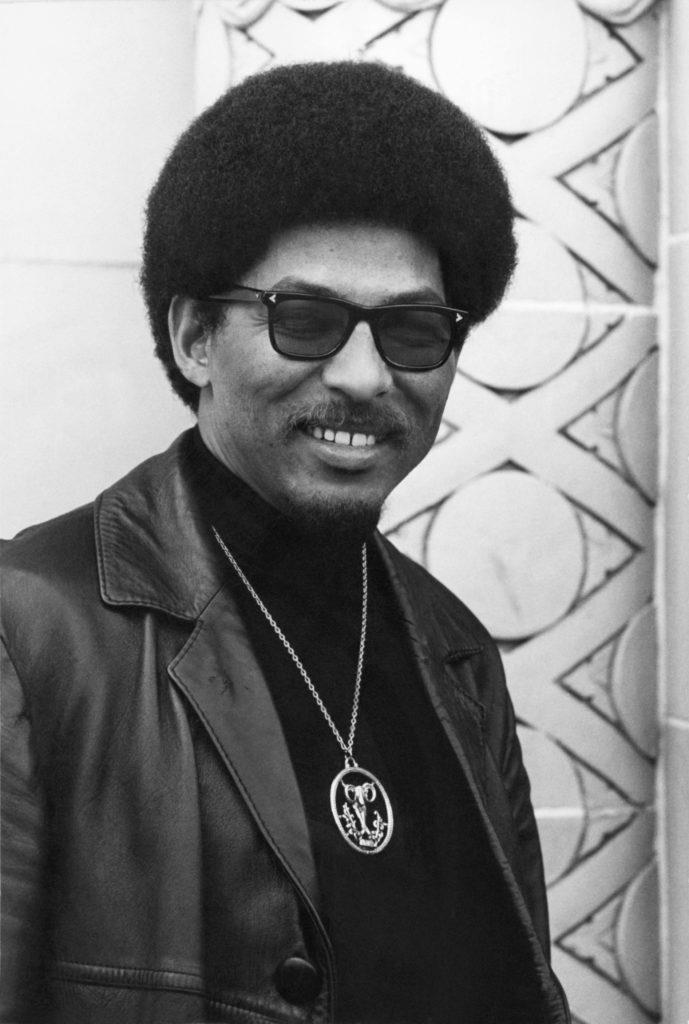
(April 16, 1936 - February 19, 2011)
[Back Cover]
Penned in 1970 by Black Panther Party Field
Marshal Don Cox, On Organizing Urban Guerilla
Units is a comprehensive account of the analysis,
strategy and techniques synthesized in his life as a
freedom fighter before, during, and after his time
within the BPP cadre.
